Sandra Beasley's Blog, page 11
November 6, 2013
News from Iowa
Since I've last posted here, I've been to New York City's Center for Book Arts, where I got to meet my chapbook for the first time and read in a line-up that included judges Sharon Dolin, Harryette Mullen, and the finalists. Before the reading, the poets stood around signing their books and broadsides; we ate family-style, a delivery of lamb and mushrooms and arugula salad from a place a few blocks away. The next morning, my family wandered through MOMA for a few hours--particularly loving the Dorothea Rockburne exhibit and Gerard Richter's "October 18, 1977" series.
A week later, I headed down to Richmond for the inaugural presentation of Art in Writing: The Mary Lynn Kotz Award, which is cosponsored by the Library of Virginia and Virginia Museum of Fine Arts. Mary Lynn is a longtime mentor and friend. The winner was Orhan Pamuk, for The Innocence of Objects--and to everyone's delight the Nobel laureate flew in to accept in person.
That Tuesday, I set out for the long drive that would bring me here...by way of a Nashville book club, a reunion with cousins, a beer at Doe's Eat Place in Paducah, Kentucky (which turned out to be run--and bartended--by the grandson of the original Doe's owners in Greenville, Mississippi), an abandoned plan to stay at the unexpectedly sketchy hotels out by the St. Louis airport, a 1 AM drive onwards to Hannibal, Missouri, a morning tour of Mark Twain's hometown, and a Friday afternoon arrival in Mount Vernon, from which I have since journeyed out to explore greater Iowa. Or, at least, Iowa City (Prairie Lights!) and Davenport.
Wonderful. And exhausting. Here are a few snapshots from the long drive, and beyond.
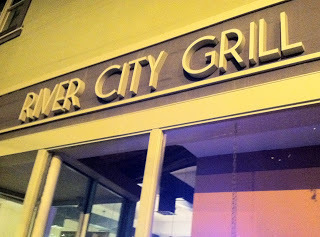 Whenever leaving town on I-81 West, I stop at River City Grill in Radford. Every time, I sit at the bar and order beer, ribs, and green beans. They know me as a traveling poet.
Whenever leaving town on I-81 West, I stop at River City Grill in Radford. Every time, I sit at the bar and order beer, ribs, and green beans. They know me as a traveling poet.
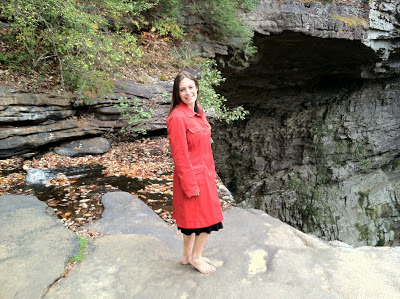 After stopping off in Harriman, TN, for the night, I saw the sign for "Ozone Falls Natural Area." I couldn't resist, and soon found myself traipsing (barefoot, since heels would have been more dangerous) to the top of a waterfall.
After stopping off in Harriman, TN, for the night, I saw the sign for "Ozone Falls Natural Area." I couldn't resist, and soon found myself traipsing (barefoot, since heels would have been more dangerous) to the top of a waterfall.

I'd show you the view straight down, but it was too scary to hold my phone out over it.
 The rocks were laced with water and my feet were very, very chilly. But worth it.
The rocks were laced with water and my feet were very, very chilly. But worth it.
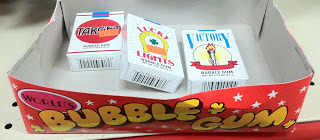 Although I do not endorse smoking, I wholeheartedly endorse puffing out clouds of powdered sugar from a bubblegum cigarette, should you happen to find a pack being sold in a gas station outside of Harriman, TN.
Although I do not endorse smoking, I wholeheartedly endorse puffing out clouds of powdered sugar from a bubblegum cigarette, should you happen to find a pack being sold in a gas station outside of Harriman, TN.
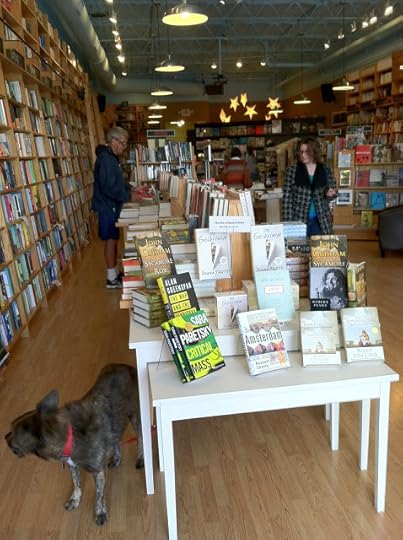 When I got to Nashville my first stop was Parnassus, Ann Patchett's bookstore. It is in bourgeoise strip mall, but so what? Great energy, brimming with amazing books, and the friendly staff helped me pick out a quartet for the children of my hosts.
When I got to Nashville my first stop was Parnassus, Ann Patchett's bookstore. It is in bourgeoise strip mall, but so what? Great energy, brimming with amazing books, and the friendly staff helped me pick out a quartet for the children of my hosts.
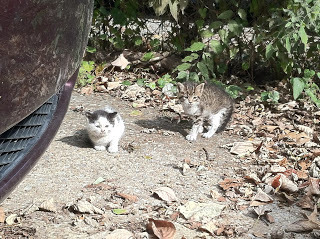 When I got to my friend's place, there were wild kittens in the driveway. Oh, I know I do not have a pet-friendly life. But in my heart, I wanted to sweep them into the car and name them Salt and Pepper.
When I got to my friend's place, there were wild kittens in the driveway. Oh, I know I do not have a pet-friendly life. But in my heart, I wanted to sweep them into the car and name them Salt and Pepper.
 Did I mention my friend has an amazingly purple house? Her book club was welcoming and engaged, and the conversation sparked by having scientists and scholars in the mix. Plus, she made Sandra-friendly cupcakes for everyone.
Did I mention my friend has an amazingly purple house? Her book club was welcoming and engaged, and the conversation sparked by having scientists and scholars in the mix. Plus, she made Sandra-friendly cupcakes for everyone.
 The next morning I bought a hat, from a shop where the owner's mother had made it.
The next morning I bought a hat, from a shop where the owner's mother had made it.
 Paducah--a scrappy little railroad town. I wish I could show you the Paducah Bridge, which takes Interstate 24 over the Ohio River to Metropolis, Illinois; the bridge is blue, and beautiful, and it rattles your car in its fist. But I had my hands full driving.
Paducah--a scrappy little railroad town. I wish I could show you the Paducah Bridge, which takes Interstate 24 over the Ohio River to Metropolis, Illinois; the bridge is blue, and beautiful, and it rattles your car in its fist. But I had my hands full driving.

After the St. Louis debacle (in which I bounced fruitlessly from airport hotel to airport hotel), I drove on to Hannibal, Missouri, for a room that advertised a jacuzzi. here it is. Keep in mind, this isn't in the bathroom--it is right next to the bed. That's a Kräftig Lager by the William K Busch Brewing Company, another gas station find.
 The American Queen riverboat was loading passengers as I arrived in Hannibal.
The American Queen riverboat was loading passengers as I arrived in Hannibal.
 Call me sentimental, but Mark Twain was one of the authors I loved most as a young writer, so it meant a lot to see where he grew up--from J.M. Clemens' Justice of the Peace Office, to the house of the girl who inspired Becky Thatcher, to the childhood home of Sam himself. Having walked those wooden floors, I'm pretty sure it's the house that is crooked, not my camera. Note the fence.
Call me sentimental, but Mark Twain was one of the authors I loved most as a young writer, so it meant a lot to see where he grew up--from J.M. Clemens' Justice of the Peace Office, to the house of the girl who inspired Becky Thatcher, to the childhood home of Sam himself. Having walked those wooden floors, I'm pretty sure it's the house that is crooked, not my camera. Note the fence.
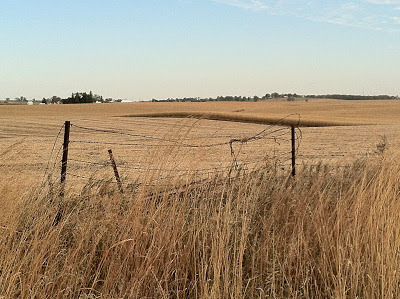 In the words of Dar Williams: Iowa, Iowa, I, Iowa
In the words of Dar Williams: Iowa, Iowa, I, Iowa
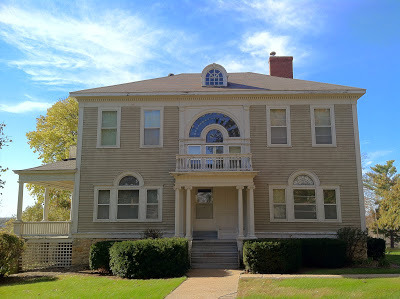 My house! Oh, not just mine: there's four of us from the Cornell College faculty living here, just yards from the President's House on campus. It is incredibly warm inside, which I'd probably be that much more grateful for in another month. For now, I have to carry an oscillating fan with me from room to room.
My house! Oh, not just mine: there's four of us from the Cornell College faculty living here, just yards from the President's House on campus. It is incredibly warm inside, which I'd probably be that much more grateful for in another month. For now, I have to carry an oscillating fan with me from room to room.
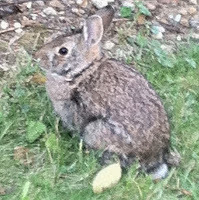 New neighbor, always grazing by the front door.
New neighbor, always grazing by the front door.
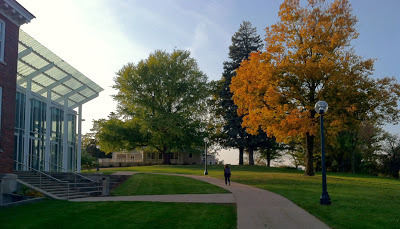 ...here's a little more of the campus. Takes about 15 minutes to walk end-to-end.
...here's a little more of the campus. Takes about 15 minutes to walk end-to-end.
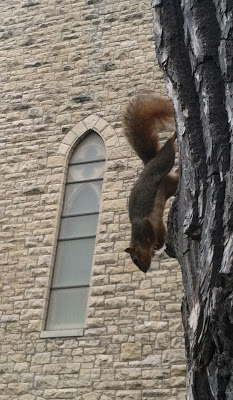 ...might be my imagination, but squirrels are a lot bigger & tawnier than in DC.
...might be my imagination, but squirrels are a lot bigger & tawnier than in DC.
 Mount Vernon's Lincoln Wine Bar is where I had my first restaurant pizza. Ever. For a woman allergic to dairy, eggs, and a zillion other things, this is no small feat. They call it "The Goodness"--red sauce, anchovies, basil--with extra chilies. Chef Matt is a funny, friendly guy who set my allergy fears at ease when his menu declared a traditional dough recipe (right down to flour sourced from "Naples, Italy, Caputo 00"). Aaron, who makes the dough, and I talked about George Saunders during his break.
Mount Vernon's Lincoln Wine Bar is where I had my first restaurant pizza. Ever. For a woman allergic to dairy, eggs, and a zillion other things, this is no small feat. They call it "The Goodness"--red sauce, anchovies, basil--with extra chilies. Chef Matt is a funny, friendly guy who set my allergy fears at ease when his menu declared a traditional dough recipe (right down to flour sourced from "Naples, Italy, Caputo 00"). Aaron, who makes the dough, and I talked about George Saunders during his break.
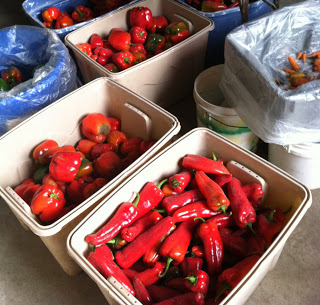 I'm not eating out much, though--there's nothing like paying $2 a bag for peppers, that goes straight to the farmer while you're standing in her barn, to inspire home cooking.
I'm not eating out much, though--there's nothing like paying $2 a bag for peppers, that goes straight to the farmer while you're standing in her barn, to inspire home cooking.
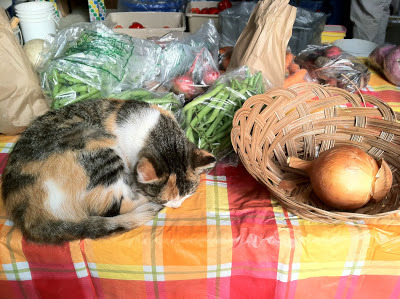 At Abbe Hills Farm, a cat oversees all important transactions. I sautéed those green beans for dinner last night, and they were amazing.
At Abbe Hills Farm, a cat oversees all important transactions. I sautéed those green beans for dinner last night, and they were amazing.
 There's a lot of quirky personalities that coexist in the Main Street community center, which everyone still calls "the old middle school." The farmer's market moves to their gym in the winters. Ruth Ipsan-Brown keeps a shop there year-round with her small sculptures, all hand-crafted from natural and found materials. The whimsy of her work reminds me of the annual Christmas display at the U.S. Botanical Gardens.
There's a lot of quirky personalities that coexist in the Main Street community center, which everyone still calls "the old middle school." The farmer's market moves to their gym in the winters. Ruth Ipsan-Brown keeps a shop there year-round with her small sculptures, all hand-crafted from natural and found materials. The whimsy of her work reminds me of the annual Christmas display at the U.S. Botanical Gardens.
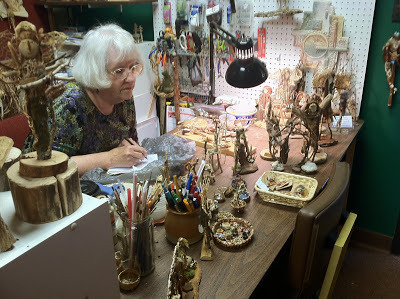 Ruth!
Ruth!
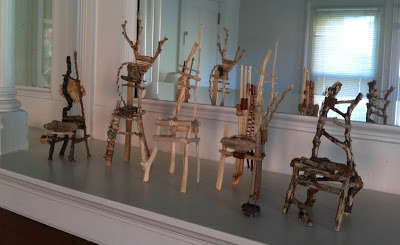 Some day, I'll be in the place where declaring "I bought chairs" means a new dining room set. But for now, I prefer these guys, Ruth's work. which have taken up residence on the fireplace mantle at Cornell College.
Some day, I'll be in the place where declaring "I bought chairs" means a new dining room set. But for now, I prefer these guys, Ruth's work. which have taken up residence on the fireplace mantle at Cornell College.
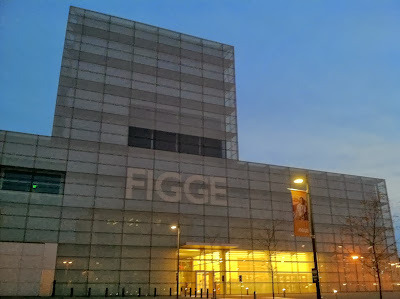 A little weekend stir-craziness took me to Davenport, one of the Quad cities, for a performance of the horror stage-play Ghost Brothers of Darkland County (Stephen King, John Mellencamp, and T. Bone Burnett). I got to town early to check out the Figge Museum, which cuts quite the silhouette along the waterfront.
A little weekend stir-craziness took me to Davenport, one of the Quad cities, for a performance of the horror stage-play Ghost Brothers of Darkland County (Stephen King, John Mellencamp, and T. Bone Burnett). I got to town early to check out the Figge Museum, which cuts quite the silhouette along the waterfront.
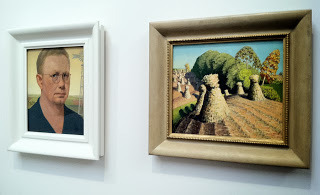 The museum has Grant Woods's eyeglasses, and the brooch he bought for his mother that made a cameo in American Gothic. Now that I'm in Iowa, I appreciate his work. (Let it be said, Figge knows how to play to local interests. There was a whole exhibit devoted to the artwork and ad design of the John Deere tractor company.)
The museum has Grant Woods's eyeglasses, and the brooch he bought for his mother that made a cameo in American Gothic. Now that I'm in Iowa, I appreciate his work. (Let it be said, Figge knows how to play to local interests. There was a whole exhibit devoted to the artwork and ad design of the John Deere tractor company.)
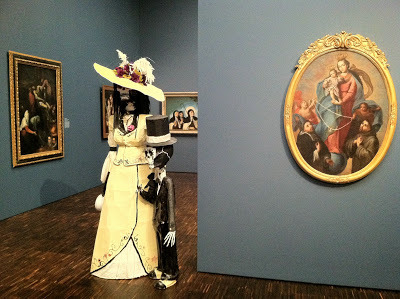 There was a temporary "Day of the Dead" exhibit of statues throughout the museum that made for some wonderful, deeply weird juxtapositions.
There was a temporary "Day of the Dead" exhibit of statues throughout the museum that made for some wonderful, deeply weird juxtapositions.
 Before the show, I walked out on the skybridge to look down the Mississippi River.
Before the show, I walked out on the skybridge to look down the Mississippi River.
Sometimes this life moves too fast for me. Photographs are a way of slowing it down. Since I sat down to cobble together this note to you, the passing trains have sounded their long howl five times. Class meets in just a few hours, and I have essays to mark up first. There are other things to tell you, but they can wait.
Traveling can change you--by diluting your sense of self, or by concentrating it. Here's what I know: I love being in front of a crowd, whether for a class or reading, but fixate on errors they probably don't even notice. I'm always on the lookout for small creatures. I eat too many potatoes. I like wearing hats in winter. I have not gotten enough sleep. This life is frazzled right now, but it is deeply & utterly mine. How could I have guessed this is what it might mean, when I declared two decades ago I wanted to be a writer?
Somehow, it all adds up to a life that I have to assume is what I was meant to do, and how I was meant to do it. This week, I got the news that I won a FY2014 Individual Artist Fellowship from the DC Commission on the Arts and Humanities. $10,000, my lord. The money comes when I needed it most. The universe smiles and says, Carry on.
A week later, I headed down to Richmond for the inaugural presentation of Art in Writing: The Mary Lynn Kotz Award, which is cosponsored by the Library of Virginia and Virginia Museum of Fine Arts. Mary Lynn is a longtime mentor and friend. The winner was Orhan Pamuk, for The Innocence of Objects--and to everyone's delight the Nobel laureate flew in to accept in person.
That Tuesday, I set out for the long drive that would bring me here...by way of a Nashville book club, a reunion with cousins, a beer at Doe's Eat Place in Paducah, Kentucky (which turned out to be run--and bartended--by the grandson of the original Doe's owners in Greenville, Mississippi), an abandoned plan to stay at the unexpectedly sketchy hotels out by the St. Louis airport, a 1 AM drive onwards to Hannibal, Missouri, a morning tour of Mark Twain's hometown, and a Friday afternoon arrival in Mount Vernon, from which I have since journeyed out to explore greater Iowa. Or, at least, Iowa City (Prairie Lights!) and Davenport.
Wonderful. And exhausting. Here are a few snapshots from the long drive, and beyond.
 Whenever leaving town on I-81 West, I stop at River City Grill in Radford. Every time, I sit at the bar and order beer, ribs, and green beans. They know me as a traveling poet.
Whenever leaving town on I-81 West, I stop at River City Grill in Radford. Every time, I sit at the bar and order beer, ribs, and green beans. They know me as a traveling poet.  After stopping off in Harriman, TN, for the night, I saw the sign for "Ozone Falls Natural Area." I couldn't resist, and soon found myself traipsing (barefoot, since heels would have been more dangerous) to the top of a waterfall.
After stopping off in Harriman, TN, for the night, I saw the sign for "Ozone Falls Natural Area." I couldn't resist, and soon found myself traipsing (barefoot, since heels would have been more dangerous) to the top of a waterfall.

I'd show you the view straight down, but it was too scary to hold my phone out over it.
 The rocks were laced with water and my feet were very, very chilly. But worth it.
The rocks were laced with water and my feet were very, very chilly. But worth it.
 Although I do not endorse smoking, I wholeheartedly endorse puffing out clouds of powdered sugar from a bubblegum cigarette, should you happen to find a pack being sold in a gas station outside of Harriman, TN.
Although I do not endorse smoking, I wholeheartedly endorse puffing out clouds of powdered sugar from a bubblegum cigarette, should you happen to find a pack being sold in a gas station outside of Harriman, TN.
 When I got to Nashville my first stop was Parnassus, Ann Patchett's bookstore. It is in bourgeoise strip mall, but so what? Great energy, brimming with amazing books, and the friendly staff helped me pick out a quartet for the children of my hosts.
When I got to Nashville my first stop was Parnassus, Ann Patchett's bookstore. It is in bourgeoise strip mall, but so what? Great energy, brimming with amazing books, and the friendly staff helped me pick out a quartet for the children of my hosts. When I got to my friend's place, there were wild kittens in the driveway. Oh, I know I do not have a pet-friendly life. But in my heart, I wanted to sweep them into the car and name them Salt and Pepper.
When I got to my friend's place, there were wild kittens in the driveway. Oh, I know I do not have a pet-friendly life. But in my heart, I wanted to sweep them into the car and name them Salt and Pepper.
 Did I mention my friend has an amazingly purple house? Her book club was welcoming and engaged, and the conversation sparked by having scientists and scholars in the mix. Plus, she made Sandra-friendly cupcakes for everyone.
Did I mention my friend has an amazingly purple house? Her book club was welcoming and engaged, and the conversation sparked by having scientists and scholars in the mix. Plus, she made Sandra-friendly cupcakes for everyone.
 The next morning I bought a hat, from a shop where the owner's mother had made it.
The next morning I bought a hat, from a shop where the owner's mother had made it.
 Paducah--a scrappy little railroad town. I wish I could show you the Paducah Bridge, which takes Interstate 24 over the Ohio River to Metropolis, Illinois; the bridge is blue, and beautiful, and it rattles your car in its fist. But I had my hands full driving.
Paducah--a scrappy little railroad town. I wish I could show you the Paducah Bridge, which takes Interstate 24 over the Ohio River to Metropolis, Illinois; the bridge is blue, and beautiful, and it rattles your car in its fist. But I had my hands full driving. 
After the St. Louis debacle (in which I bounced fruitlessly from airport hotel to airport hotel), I drove on to Hannibal, Missouri, for a room that advertised a jacuzzi. here it is. Keep in mind, this isn't in the bathroom--it is right next to the bed. That's a Kräftig Lager by the William K Busch Brewing Company, another gas station find.
 The American Queen riverboat was loading passengers as I arrived in Hannibal.
The American Queen riverboat was loading passengers as I arrived in Hannibal.
 Call me sentimental, but Mark Twain was one of the authors I loved most as a young writer, so it meant a lot to see where he grew up--from J.M. Clemens' Justice of the Peace Office, to the house of the girl who inspired Becky Thatcher, to the childhood home of Sam himself. Having walked those wooden floors, I'm pretty sure it's the house that is crooked, not my camera. Note the fence.
Call me sentimental, but Mark Twain was one of the authors I loved most as a young writer, so it meant a lot to see where he grew up--from J.M. Clemens' Justice of the Peace Office, to the house of the girl who inspired Becky Thatcher, to the childhood home of Sam himself. Having walked those wooden floors, I'm pretty sure it's the house that is crooked, not my camera. Note the fence. In the words of Dar Williams: Iowa, Iowa, I, Iowa
In the words of Dar Williams: Iowa, Iowa, I, Iowa My house! Oh, not just mine: there's four of us from the Cornell College faculty living here, just yards from the President's House on campus. It is incredibly warm inside, which I'd probably be that much more grateful for in another month. For now, I have to carry an oscillating fan with me from room to room.
My house! Oh, not just mine: there's four of us from the Cornell College faculty living here, just yards from the President's House on campus. It is incredibly warm inside, which I'd probably be that much more grateful for in another month. For now, I have to carry an oscillating fan with me from room to room.
 New neighbor, always grazing by the front door.
New neighbor, always grazing by the front door.  ...here's a little more of the campus. Takes about 15 minutes to walk end-to-end.
...here's a little more of the campus. Takes about 15 minutes to walk end-to-end.
 ...might be my imagination, but squirrels are a lot bigger & tawnier than in DC.
...might be my imagination, but squirrels are a lot bigger & tawnier than in DC.
 Mount Vernon's Lincoln Wine Bar is where I had my first restaurant pizza. Ever. For a woman allergic to dairy, eggs, and a zillion other things, this is no small feat. They call it "The Goodness"--red sauce, anchovies, basil--with extra chilies. Chef Matt is a funny, friendly guy who set my allergy fears at ease when his menu declared a traditional dough recipe (right down to flour sourced from "Naples, Italy, Caputo 00"). Aaron, who makes the dough, and I talked about George Saunders during his break.
Mount Vernon's Lincoln Wine Bar is where I had my first restaurant pizza. Ever. For a woman allergic to dairy, eggs, and a zillion other things, this is no small feat. They call it "The Goodness"--red sauce, anchovies, basil--with extra chilies. Chef Matt is a funny, friendly guy who set my allergy fears at ease when his menu declared a traditional dough recipe (right down to flour sourced from "Naples, Italy, Caputo 00"). Aaron, who makes the dough, and I talked about George Saunders during his break.
 I'm not eating out much, though--there's nothing like paying $2 a bag for peppers, that goes straight to the farmer while you're standing in her barn, to inspire home cooking.
I'm not eating out much, though--there's nothing like paying $2 a bag for peppers, that goes straight to the farmer while you're standing in her barn, to inspire home cooking.
 At Abbe Hills Farm, a cat oversees all important transactions. I sautéed those green beans for dinner last night, and they were amazing.
At Abbe Hills Farm, a cat oversees all important transactions. I sautéed those green beans for dinner last night, and they were amazing.
 There's a lot of quirky personalities that coexist in the Main Street community center, which everyone still calls "the old middle school." The farmer's market moves to their gym in the winters. Ruth Ipsan-Brown keeps a shop there year-round with her small sculptures, all hand-crafted from natural and found materials. The whimsy of her work reminds me of the annual Christmas display at the U.S. Botanical Gardens.
There's a lot of quirky personalities that coexist in the Main Street community center, which everyone still calls "the old middle school." The farmer's market moves to their gym in the winters. Ruth Ipsan-Brown keeps a shop there year-round with her small sculptures, all hand-crafted from natural and found materials. The whimsy of her work reminds me of the annual Christmas display at the U.S. Botanical Gardens.
 Ruth!
Ruth!
 Some day, I'll be in the place where declaring "I bought chairs" means a new dining room set. But for now, I prefer these guys, Ruth's work. which have taken up residence on the fireplace mantle at Cornell College.
Some day, I'll be in the place where declaring "I bought chairs" means a new dining room set. But for now, I prefer these guys, Ruth's work. which have taken up residence on the fireplace mantle at Cornell College.
 A little weekend stir-craziness took me to Davenport, one of the Quad cities, for a performance of the horror stage-play Ghost Brothers of Darkland County (Stephen King, John Mellencamp, and T. Bone Burnett). I got to town early to check out the Figge Museum, which cuts quite the silhouette along the waterfront.
A little weekend stir-craziness took me to Davenport, one of the Quad cities, for a performance of the horror stage-play Ghost Brothers of Darkland County (Stephen King, John Mellencamp, and T. Bone Burnett). I got to town early to check out the Figge Museum, which cuts quite the silhouette along the waterfront.
 The museum has Grant Woods's eyeglasses, and the brooch he bought for his mother that made a cameo in American Gothic. Now that I'm in Iowa, I appreciate his work. (Let it be said, Figge knows how to play to local interests. There was a whole exhibit devoted to the artwork and ad design of the John Deere tractor company.)
The museum has Grant Woods's eyeglasses, and the brooch he bought for his mother that made a cameo in American Gothic. Now that I'm in Iowa, I appreciate his work. (Let it be said, Figge knows how to play to local interests. There was a whole exhibit devoted to the artwork and ad design of the John Deere tractor company.)
 There was a temporary "Day of the Dead" exhibit of statues throughout the museum that made for some wonderful, deeply weird juxtapositions.
There was a temporary "Day of the Dead" exhibit of statues throughout the museum that made for some wonderful, deeply weird juxtapositions.
 Before the show, I walked out on the skybridge to look down the Mississippi River.
Before the show, I walked out on the skybridge to look down the Mississippi River. Sometimes this life moves too fast for me. Photographs are a way of slowing it down. Since I sat down to cobble together this note to you, the passing trains have sounded their long howl five times. Class meets in just a few hours, and I have essays to mark up first. There are other things to tell you, but they can wait.
Traveling can change you--by diluting your sense of self, or by concentrating it. Here's what I know: I love being in front of a crowd, whether for a class or reading, but fixate on errors they probably don't even notice. I'm always on the lookout for small creatures. I eat too many potatoes. I like wearing hats in winter. I have not gotten enough sleep. This life is frazzled right now, but it is deeply & utterly mine. How could I have guessed this is what it might mean, when I declared two decades ago I wanted to be a writer?
Somehow, it all adds up to a life that I have to assume is what I was meant to do, and how I was meant to do it. This week, I got the news that I won a FY2014 Individual Artist Fellowship from the DC Commission on the Arts and Humanities. $10,000, my lord. The money comes when I needed it most. The universe smiles and says, Carry on.
Published on November 06, 2013 05:05
October 8, 2013
5 AM Thoughts, North Carolina (& Back Again)
*Before I forget: I am hosting a kickass fiction event at the Arts Club of Washington this Wednesday (October 9; full description here) with novelists Mary Kay Zuravleff and Lisa Gorman, and journalist Judith Warner. Please come if you're in DC! And if you're in New York, perhaps I'll see you at the Center for Book Arts reading this Friday (October 11). It'll be my first chance to hold this brand-new chapbook...
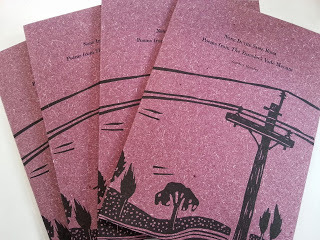
A confession: I was going to to write here about Miley Cyrus and the anguish-porn of talented twenty-something girls. (The ambiguity of "of," because that is something both put upon them and championed within.) I took screen caps from the "Wrecking Ball" video and everything. But that story is moving too fast. Anything I write today might be contradicted tomorrow. I'm keeping an eye on it.
Also: I'm going to devote a post to this in the future, but for now I want to share the news that I've joined the faculty of the University of Tampa's low-residency MFA program (which, thankfully, I can do from D.C.). I'm taking the leap because my experiences at the Writer's Center and elsewhere have been deeply rewarding--but there's such a great opportunity to develop a philosophy of craft that works best with a serious, longterm commitment from students. If you're interested in hearing more, and would even consider enrolling in the program, feel free to email me. We will not talk about Miley Cyrus, I promise. Unless you specifically request it.
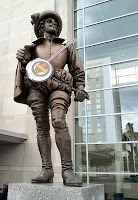 The other week, we drove down to Raleigh, NC, for the annual International Bluegrass Music Association award show. It was a stunning three days of music. Tony Rice was inducted into the Hall of Fame, which was important for all kinds of reasons to be elaborated on at a later date. I attended a live WAMU recording, which gave me a bit of hometown pride. I got to hear Frank Solivan & Dirty Kitchen; congrats to Mike Munford, their banjoist, for his IBMA award. If you're ever looking for a great night out in Raleigh, next door to The Pour House Music Hall is Bida Manda, an authentic Laotian restaurant. We managed to snag the last two seats at the bar for dinner one night and I had the Mee Ka Tee, a pork belly & rice noodle soup, which was just as indulgent as you would imagine.
The other week, we drove down to Raleigh, NC, for the annual International Bluegrass Music Association award show. It was a stunning three days of music. Tony Rice was inducted into the Hall of Fame, which was important for all kinds of reasons to be elaborated on at a later date. I attended a live WAMU recording, which gave me a bit of hometown pride. I got to hear Frank Solivan & Dirty Kitchen; congrats to Mike Munford, their banjoist, for his IBMA award. If you're ever looking for a great night out in Raleigh, next door to The Pour House Music Hall is Bida Manda, an authentic Laotian restaurant. We managed to snag the last two seats at the bar for dinner one night and I had the Mee Ka Tee, a pork belly & rice noodle soup, which was just as indulgent as you would imagine.
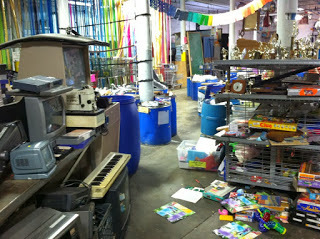
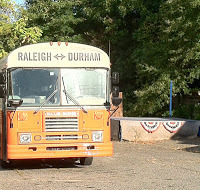 We trekked over to Durham, which I'd never visited before. The Scrap Exchange is an amazing nonprofit "creative reuse center," a warehouse space filled with wallpaper remnants, plastic bits, feathers, discarded TVs and radios, boxes, yarns--all the quality junk that can inspire an artist, priced to be bought with the coins out of your pocket. Later, along Duke's college corner, my love shopped for records and I shopped for dresses; we both found something that suited us, then headed to Geer Street Garden for dinner, and from there to a friend's art opening in Chapel Hill. I'm hoping to get back to do a reading at The Regulator Bookshop with Count the Waves. While there I bought a copy of Scott McClanahan's Crapalachia: A Biography of Place, and when I introduced myself to the bookseller he turned out to be the son of author John Dufresne. The day just had that kind of serendipity to it.
We trekked over to Durham, which I'd never visited before. The Scrap Exchange is an amazing nonprofit "creative reuse center," a warehouse space filled with wallpaper remnants, plastic bits, feathers, discarded TVs and radios, boxes, yarns--all the quality junk that can inspire an artist, priced to be bought with the coins out of your pocket. Later, along Duke's college corner, my love shopped for records and I shopped for dresses; we both found something that suited us, then headed to Geer Street Garden for dinner, and from there to a friend's art opening in Chapel Hill. I'm hoping to get back to do a reading at The Regulator Bookshop with Count the Waves. While there I bought a copy of Scott McClanahan's Crapalachia: A Biography of Place, and when I introduced myself to the bookseller he turned out to be the son of author John Dufresne. The day just had that kind of serendipity to it.
Our last afternoon in town we explored the North Carolina Museum of Art. Wow. Though I loved Hickory, this was the more revelatory trip in terms of North Carolina's contemporary, edgier sensibilities.
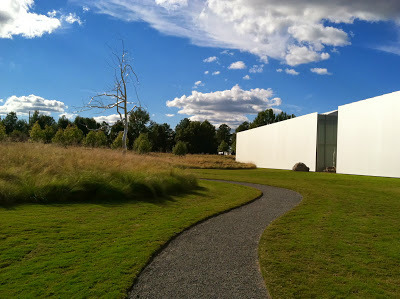
Every nook was an opportunity for sculpture; we almost missed the Rodin garden.

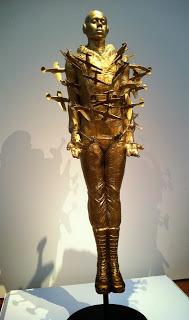 Inside the museum, there were intriguing works by everyone from Joseph Cornell to Kehinde Wiley. The sculpture Tar Baby vs. Saint Sebastian, by Michael Richard, would have been mesmerizing by any standard in its tribute to the Tuskegee Airmen. But the image--cast from the artist's body--is especially haunting knowing that he was killed while in his New York studio, located on the 92nd floor of World Trade Center's Tower One, on September 11, 2001.
Inside the museum, there were intriguing works by everyone from Joseph Cornell to Kehinde Wiley. The sculpture Tar Baby vs. Saint Sebastian, by Michael Richard, would have been mesmerizing by any standard in its tribute to the Tuskegee Airmen. But the image--cast from the artist's body--is especially haunting knowing that he was killed while in his New York studio, located on the 92nd floor of World Trade Center's Tower One, on September 11, 2001.
Beyond the museum is a sprawling park, which houses many more large-scale artworks. There was a nice mix of seclusion and open expanse. We hunkered down in Chris Drury's "Cloud Champber for the Trees and Sky." Vollis Simpson's "Wind Machine" was a-spin. I'm not going to wax poetic. I'm just going to let you gawk over my shoulder at Thomas Syre's "Gyre."

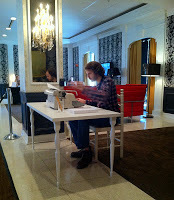 We made it back to DC and promptly collapsed into sore throats and grumpy unpacking. We rallied enough for this past weekend's (e)merge art fair, at the Capitol Skyline Hotel--right by the Nats baseball stadium--which belongs to the Rubell family. On Sunday we armed ourselves with bloody marys, and set to wandering. In the lobby Andrew Wodzianski was enacting a "Self Portrait as Jack Torrance," typing All work and no play makes Jack a dull boy over and over on a manual typewriter. Setting a different tone, the lovely Holly Bass was conducting an "Art Baptism" out by the pool, under a wind-whipped canopy, complete with community music.
We made it back to DC and promptly collapsed into sore throats and grumpy unpacking. We rallied enough for this past weekend's (e)merge art fair, at the Capitol Skyline Hotel--right by the Nats baseball stadium--which belongs to the Rubell family. On Sunday we armed ourselves with bloody marys, and set to wandering. In the lobby Andrew Wodzianski was enacting a "Self Portrait as Jack Torrance," typing All work and no play makes Jack a dull boy over and over on a manual typewriter. Setting a different tone, the lovely Holly Bass was conducting an "Art Baptism" out by the pool, under a wind-whipped canopy, complete with community music.
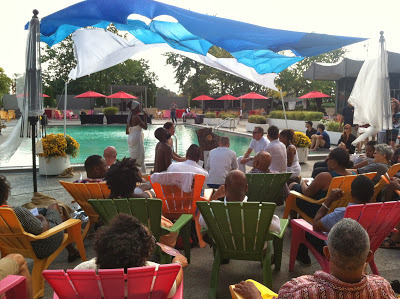
A half-dozen followers stepped up to announce their artistic ambitions, and to invoke the names (privately, as scribbled on a slip of paper) of three people who sustain their spiritual selves. Then Holly baptized them in the Skyline's pool. It felt like I was back in Miami for a minute, in the best of ways. I felt refreshed. I sang loud.
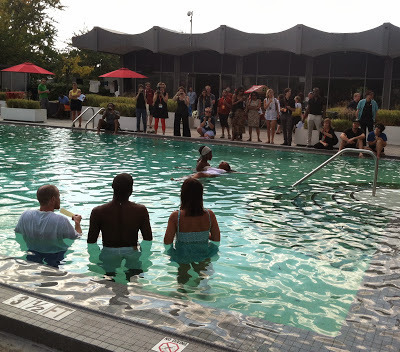 Things are a little frantic in Sandra-land right now. So this is the last you'll hear from me on the blog for a couple of weeks, until I'm in IOWA. Iowa! Where I'll live all November thanks to Cornell College, teaching creative nonfiction and, y'know, frolicking in corn fields. But maybe I'll see you, in DC or New York City? Until then~
Things are a little frantic in Sandra-land right now. So this is the last you'll hear from me on the blog for a couple of weeks, until I'm in IOWA. Iowa! Where I'll live all November thanks to Cornell College, teaching creative nonfiction and, y'know, frolicking in corn fields. But maybe I'll see you, in DC or New York City? Until then~

A confession: I was going to to write here about Miley Cyrus and the anguish-porn of talented twenty-something girls. (The ambiguity of "of," because that is something both put upon them and championed within.) I took screen caps from the "Wrecking Ball" video and everything. But that story is moving too fast. Anything I write today might be contradicted tomorrow. I'm keeping an eye on it.
Also: I'm going to devote a post to this in the future, but for now I want to share the news that I've joined the faculty of the University of Tampa's low-residency MFA program (which, thankfully, I can do from D.C.). I'm taking the leap because my experiences at the Writer's Center and elsewhere have been deeply rewarding--but there's such a great opportunity to develop a philosophy of craft that works best with a serious, longterm commitment from students. If you're interested in hearing more, and would even consider enrolling in the program, feel free to email me. We will not talk about Miley Cyrus, I promise. Unless you specifically request it.
 The other week, we drove down to Raleigh, NC, for the annual International Bluegrass Music Association award show. It was a stunning three days of music. Tony Rice was inducted into the Hall of Fame, which was important for all kinds of reasons to be elaborated on at a later date. I attended a live WAMU recording, which gave me a bit of hometown pride. I got to hear Frank Solivan & Dirty Kitchen; congrats to Mike Munford, their banjoist, for his IBMA award. If you're ever looking for a great night out in Raleigh, next door to The Pour House Music Hall is Bida Manda, an authentic Laotian restaurant. We managed to snag the last two seats at the bar for dinner one night and I had the Mee Ka Tee, a pork belly & rice noodle soup, which was just as indulgent as you would imagine.
The other week, we drove down to Raleigh, NC, for the annual International Bluegrass Music Association award show. It was a stunning three days of music. Tony Rice was inducted into the Hall of Fame, which was important for all kinds of reasons to be elaborated on at a later date. I attended a live WAMU recording, which gave me a bit of hometown pride. I got to hear Frank Solivan & Dirty Kitchen; congrats to Mike Munford, their banjoist, for his IBMA award. If you're ever looking for a great night out in Raleigh, next door to The Pour House Music Hall is Bida Manda, an authentic Laotian restaurant. We managed to snag the last two seats at the bar for dinner one night and I had the Mee Ka Tee, a pork belly & rice noodle soup, which was just as indulgent as you would imagine. 
 We trekked over to Durham, which I'd never visited before. The Scrap Exchange is an amazing nonprofit "creative reuse center," a warehouse space filled with wallpaper remnants, plastic bits, feathers, discarded TVs and radios, boxes, yarns--all the quality junk that can inspire an artist, priced to be bought with the coins out of your pocket. Later, along Duke's college corner, my love shopped for records and I shopped for dresses; we both found something that suited us, then headed to Geer Street Garden for dinner, and from there to a friend's art opening in Chapel Hill. I'm hoping to get back to do a reading at The Regulator Bookshop with Count the Waves. While there I bought a copy of Scott McClanahan's Crapalachia: A Biography of Place, and when I introduced myself to the bookseller he turned out to be the son of author John Dufresne. The day just had that kind of serendipity to it.
We trekked over to Durham, which I'd never visited before. The Scrap Exchange is an amazing nonprofit "creative reuse center," a warehouse space filled with wallpaper remnants, plastic bits, feathers, discarded TVs and radios, boxes, yarns--all the quality junk that can inspire an artist, priced to be bought with the coins out of your pocket. Later, along Duke's college corner, my love shopped for records and I shopped for dresses; we both found something that suited us, then headed to Geer Street Garden for dinner, and from there to a friend's art opening in Chapel Hill. I'm hoping to get back to do a reading at The Regulator Bookshop with Count the Waves. While there I bought a copy of Scott McClanahan's Crapalachia: A Biography of Place, and when I introduced myself to the bookseller he turned out to be the son of author John Dufresne. The day just had that kind of serendipity to it. Our last afternoon in town we explored the North Carolina Museum of Art. Wow. Though I loved Hickory, this was the more revelatory trip in terms of North Carolina's contemporary, edgier sensibilities.

Every nook was an opportunity for sculpture; we almost missed the Rodin garden.

 Inside the museum, there were intriguing works by everyone from Joseph Cornell to Kehinde Wiley. The sculpture Tar Baby vs. Saint Sebastian, by Michael Richard, would have been mesmerizing by any standard in its tribute to the Tuskegee Airmen. But the image--cast from the artist's body--is especially haunting knowing that he was killed while in his New York studio, located on the 92nd floor of World Trade Center's Tower One, on September 11, 2001.
Inside the museum, there were intriguing works by everyone from Joseph Cornell to Kehinde Wiley. The sculpture Tar Baby vs. Saint Sebastian, by Michael Richard, would have been mesmerizing by any standard in its tribute to the Tuskegee Airmen. But the image--cast from the artist's body--is especially haunting knowing that he was killed while in his New York studio, located on the 92nd floor of World Trade Center's Tower One, on September 11, 2001.Beyond the museum is a sprawling park, which houses many more large-scale artworks. There was a nice mix of seclusion and open expanse. We hunkered down in Chris Drury's "Cloud Champber for the Trees and Sky." Vollis Simpson's "Wind Machine" was a-spin. I'm not going to wax poetic. I'm just going to let you gawk over my shoulder at Thomas Syre's "Gyre."

 We made it back to DC and promptly collapsed into sore throats and grumpy unpacking. We rallied enough for this past weekend's (e)merge art fair, at the Capitol Skyline Hotel--right by the Nats baseball stadium--which belongs to the Rubell family. On Sunday we armed ourselves with bloody marys, and set to wandering. In the lobby Andrew Wodzianski was enacting a "Self Portrait as Jack Torrance," typing All work and no play makes Jack a dull boy over and over on a manual typewriter. Setting a different tone, the lovely Holly Bass was conducting an "Art Baptism" out by the pool, under a wind-whipped canopy, complete with community music.
We made it back to DC and promptly collapsed into sore throats and grumpy unpacking. We rallied enough for this past weekend's (e)merge art fair, at the Capitol Skyline Hotel--right by the Nats baseball stadium--which belongs to the Rubell family. On Sunday we armed ourselves with bloody marys, and set to wandering. In the lobby Andrew Wodzianski was enacting a "Self Portrait as Jack Torrance," typing All work and no play makes Jack a dull boy over and over on a manual typewriter. Setting a different tone, the lovely Holly Bass was conducting an "Art Baptism" out by the pool, under a wind-whipped canopy, complete with community music.
A half-dozen followers stepped up to announce their artistic ambitions, and to invoke the names (privately, as scribbled on a slip of paper) of three people who sustain their spiritual selves. Then Holly baptized them in the Skyline's pool. It felt like I was back in Miami for a minute, in the best of ways. I felt refreshed. I sang loud.
 Things are a little frantic in Sandra-land right now. So this is the last you'll hear from me on the blog for a couple of weeks, until I'm in IOWA. Iowa! Where I'll live all November thanks to Cornell College, teaching creative nonfiction and, y'know, frolicking in corn fields. But maybe I'll see you, in DC or New York City? Until then~
Things are a little frantic in Sandra-land right now. So this is the last you'll hear from me on the blog for a couple of weeks, until I'm in IOWA. Iowa! Where I'll live all November thanks to Cornell College, teaching creative nonfiction and, y'know, frolicking in corn fields. But maybe I'll see you, in DC or New York City? Until then~
Published on October 08, 2013 04:02
September 24, 2013
A Minor Manifesto on Readings
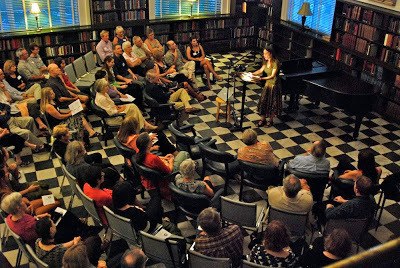
This photograph is from a wonderful evening I had with the Poetry Society of South Carolina, during a 2011 reading in Charleston. I've had a few conversations lately about literary tours, and it reminded me of a piece I wrote for SheWrites, "On Arranging Readings," as part of my 2010 "Countdown to Publication" for I Was the Jukebox. I used the same philosophies in touring to support Don't Kill the Birthday Girl. When I find myself demoralized, or a reading goes poorly (I have those nights too) it is usually because I've violated one of these tenets:
1) Don't fixate on a cross-country "book tour," or multiple stops in the same city.
2) Embrace the idea of a "book stop" in tandem with non-literary travel.
3) Reach out to friends--but forgive them if they do not help.
4) If you hope to feature in a series with an open mic, take part in the open mic some earlier week.
5) If no one shows up to your reading, it doesn't mean you're a bad writer.
6) Be prepared to be your own cashbox; carry small change.
7) For particularly young or elderly audiences, be prepared to mix in the work of famous authors.
8) Don't go past your allotted timing just because you came a long way.
9) Use your curriculum vitae as the basis to brainstorm reading venues.
10) Don't give away a copy of your book just because you want someone to host you.
If any of those seem strange, or need further explaining, check out my original post. But in thinking about my subsequent experiences, I would add this:
Take the word "favor" out of your vocabulary.
This feels counterintuitive, because we think of the poetry world as a close (some say incestuous) community that constantly trades on favors. This dictate is not meant to negate generosity. We're all doing this on limited budgets, usually volunteering our time. We do these things for pleasure, and because we're part of a social pact. And yet.
When it comes to the practical details of your event, nothing corrodes a reading experience faster than the belief that someone is doing someone a favor. If you can't approach the event in good faith and true enthusiasm, it's not gonna fly.
The guest who thinks he is favoring the series with his presence often reads too long (or occasionally, too little) and fails to engage the audience.
The host who does the author a favor by fitting her in, after the umpteenth query, tends to do a lackluster job promoting. (One thing I've learned: when I have to pound down the door of the bookstore or club, it's rarely worth it. Even a great or fabled venue is no fun, if you don't feel truly welcome or championed.)
When you're doing someone a favor, you're not acting in a professional mode. That's when the requested bio, hi-res headshot and cover art, and contact for book stock comes in at the last minute or, though sent in promptly, is never used. That's when people get frustrated because it's unclear who is processing sales, or collecting emails for the list, or where the suggested cover donation is actually going.
Sometimes there's this queasy moment at the end of the night. Maybe you've seen it. The reader and the host are standing together. The reader is thinking Dammit, I owe the host a copy of the book--though, between gas and time off from work, he's already losing money on this gig--and the host is thinking Dammit, I need to buy his book--though, between dinner and time off from work, he's already losing money on this gig--and whether money changes hands or not, the poor book gets handed over like a sprouty potato.
That's what gets to people, when their work is bargained down to nothing more than a token. Resist. Dinner or a couch to crash on; these can be favors (and hey, if you're the guest, buy your host a drink). But your reading or series--that audience, your time, your stock--these are not to be offered up as favors, or treated as such. The trick is to conserve precious resources, on both sides, while keeping one's ego in check.
I'm not saying I get the balance right all the time. But I'm trying.
Published on September 24, 2013 07:43
September 17, 2013
For Your October Consideration
I am ready for fall. I am ready for three-quarter sleeves, bowls of bean soup, and hot drinks spiked with bourbon. I am ready for the air to sweeten with chimney smoke.
I want to send off this dang manuscript, for better or for worse. I already have the next poetry project in mind. And I'm even ready to be on the road again.
October will bring some lovely happenings, and I want to be sure they're on your radar.
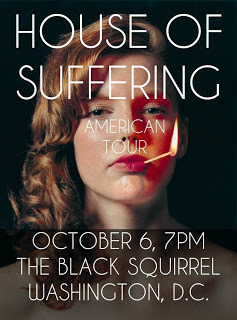 "House of Suffering American Tour"with Beasley, Dove, Schoonebeek, Schweig, and ZinggSunday, October 6 - 7 PM - The Black Squirrel (2427 18th St NW)in WASHINGTON, DC
Facebook event details/RSVP here
Free & open to the public
"House of Suffering American Tour"with Beasley, Dove, Schoonebeek, Schweig, and ZinggSunday, October 6 - 7 PM - The Black Squirrel (2427 18th St NW)in WASHINGTON, DC
Facebook event details/RSVP here
Free & open to the public
I'll be reading as part of the fifth stop of Danniel Schoonebeek’s tour ("so come on out and bring him an extra pair of socks"). The other writers include:
Michelle Dove, whose fiction appears or is forthcoming in New South, The Southeast Review, Passages North, Barrelhouse, PANK, Pear Noir!, and elsewhere. Her work received the John Steinbeck Award for the Short Story and the Fiction Prize from Style Weekly. She lives in Washington, D.C.
Danniel Schoonebeek, whose first book of poems, American Barricade, will be published in 2014 by YesYes Books. A chapbook, Family Album, is forthcoming from Poor Claudia this fall. His work has appeared or is forthcoming in Tin House, Boston Review, Fence, Guernica, Denver Quarterly, Gulf Coast, jubilat, BOMB, Verse Daily, Drunken Boat, and elsewhere. He writes a monthly column on poetry for The American Reader, hosts the Hatchet Job reading series in Brooklyn, and edits the PEN Poetry Series. Find him at dannielschoonebeek.tumblr.com.
Sarah V. Schweig, author of the chapbook S (Dancing Girl Press). Her poems and reviews have appeared in Black Warrior Review, BOMB, Boston Review, Gulf Coast, Painted Bride Quarterly, and Verse Daily, among others. A graduate of the University of Virginia and Columbia University, she lives in Brooklyn. Find her at sarahvschweig.blogspot.com.
Matthew Zingg, whose work can be read in The Awl, Sink Review, The Madison Review, Muzzle, Blackbird, HTML Giant, The Paris-American, and The Rumpus, among others. He received his MFA from Adelphi University and currently lives in Baltimore where he curates the Federal Dust Reading Series.
###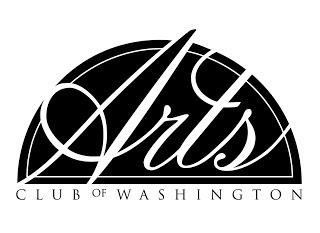 "Shrinks On the Page, Pen in the Hand": Readings and Conversation with Mary Kay Zuravleff, Lisa Gornick, and Judith WarnerWednesday, October 9 - 7 PM - Arts Club of Washington (2017 I St NW)in WASHINGTON, DC
ACW website (check event calendar for details)
Free & open to the public
"Shrinks On the Page, Pen in the Hand": Readings and Conversation with Mary Kay Zuravleff, Lisa Gornick, and Judith WarnerWednesday, October 9 - 7 PM - Arts Club of Washington (2017 I St NW)in WASHINGTON, DC
ACW website (check event calendar for details)
Free & open to the public
I'll be hosting this, in a welcome return to co-chairing Literary programs at the Arts Club. Novelists Mary Kay Zuravleff and Lisa Gornick read from their latest books, and talk with journalist Judith Warner about their work and the writing life.
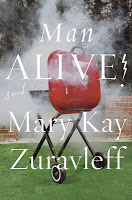 Two new books by noted fiction writers trace the effects of trauma on contemporary families. In Zuravleff's MAN ALIVE!, all it takes is a quarter to change pediatric psychiatrist Dr. Owen Lerner’s life. When the coin he’s feeding into a parking meter is struck by lightning, Lerner survives--except that now all he wants to do is barbecue. What will happen to his patients, who rely on him to make sense of their world? What will happen to his family?
Two new books by noted fiction writers trace the effects of trauma on contemporary families. In Zuravleff's MAN ALIVE!, all it takes is a quarter to change pediatric psychiatrist Dr. Owen Lerner’s life. When the coin he’s feeding into a parking meter is struck by lightning, Lerner survives--except that now all he wants to do is barbecue. What will happen to his patients, who rely on him to make sense of their world? What will happen to his family?
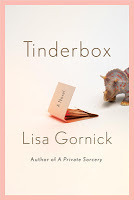
In Gornick's TINDERBOX, Myra is a Manhattan psychotherapist who hires a new nanny, Eva, who cleans like a demon and irons like a dream. Eva forms an immediate bond with Myra’s grandson. But once Eva, a Peruvian immigrant, settles into Myra’s patient chair to share her story, their relationship intensifies. Myra soon learns that even a family as close-knit as her own can have plenty to hide.
Each writer will share a brief passage from their books, before being joined by Warner for a moderated conversation. Warner, the author of We’ve Got Issues: Children and Parents in the Age of Medication, will explore how each came to center a book on a psychologist as protagonist, and other common themes. The three will also discuss the realities of being modern writers, particularly as women navigating the publishing industry.
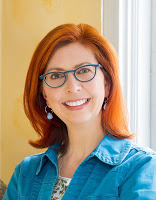 Mary Kay Zuravleff is the author of Man Alive! as well as The Bowl Is Already Broken, which The New York Times praised as “a tart, affectionate satire of the museum world’s bickering and scheming,” and The Frequency of Souls, which the Chicago Tribune deemed “a beguiling and wildly inventive first novel.” Honors for her work include the American Academy’s Rosenthal Award and the James Jones First Novel Award, and she has been nominated for the Orange Prize. She lives in Washington, D.C., where she serves on the board of the PEN/Faulkner Foundation and is a cofounder of the D.C. Women Writers Group.
Mary Kay Zuravleff is the author of Man Alive! as well as The Bowl Is Already Broken, which The New York Times praised as “a tart, affectionate satire of the museum world’s bickering and scheming,” and The Frequency of Souls, which the Chicago Tribune deemed “a beguiling and wildly inventive first novel.” Honors for her work include the American Academy’s Rosenthal Award and the James Jones First Novel Award, and she has been nominated for the Orange Prize. She lives in Washington, D.C., where she serves on the board of the PEN/Faulkner Foundation and is a cofounder of the D.C. Women Writers Group.
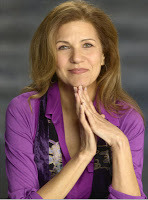 Lisa Gornick is a clinical psychologist and writer living in New York. She is the author of two novels, A Private Sorcery (Algonquin) and Tinderbox (Sarah Crichton Books/ Farrar, Straus and Giroux). She earned a doctorate in clinical psychology at Yale, and is a graduate of the writing program at N.Y.U. and the psychoanalytic training program at Columbia. A collection of linked stories, Louisa Meets Bear, is forthcoming with Sarah Crichton Books/ Farrar, Straus and Giroux.
Lisa Gornick is a clinical psychologist and writer living in New York. She is the author of two novels, A Private Sorcery (Algonquin) and Tinderbox (Sarah Crichton Books/ Farrar, Straus and Giroux). She earned a doctorate in clinical psychology at Yale, and is a graduate of the writing program at N.Y.U. and the psychoanalytic training program at Columbia. A collection of linked stories, Louisa Meets Bear, is forthcoming with Sarah Crichton Books/ Farrar, Straus and Giroux.
Judith Warner is best known for her New York Times bestseller, Perfect Madness: Motherhood in the Age of Anxiety (Riverhead, 2005), and for her New York Times column, “Domestic Disturbances.” She is a contributing writer for the New York Times Magazine, an opinion columnist for Time.com, and a Senior Fellow at the Center for American Progress. Her latest book, We’ve Got Issues: Children and Parents in the Age of Medication (Riverhead, 2011), received an Outstanding Media Award for Science and Health Reporting from the National Alliance on Mental Illness.
A signing and light reception will follow, with books available for purchase.
###
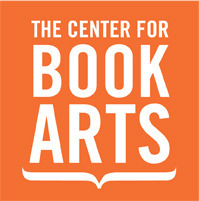
Annual Chapbook Reading Friday, October 11 - 6:30 PM - Center for Book Arts (28 West 27th Street) in NEW YORK CITY Center for Book Arts website Suggested donation $10/ $5 members
A reading to celebrate my 2013 chapbook, "None in the Same Room: Poems from the Traveler's Vade Mecum," winner of the annual contest, with judges Sharon Dolin and Harryette Mullen, and Honorable Mentions Sheila Carter-Jones and Alexandra Regalado. Chapbooks and broadsides will be available for purchase.
###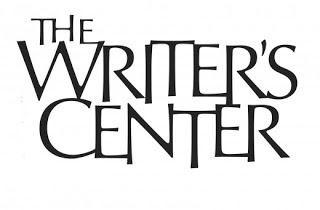
"Make Lit Happen: Journeys Through the MFA and Beyond"
Saturday, October 12 - 10 AM-3 PM - The Writer's Center (4508 Walsh Street) in BETHESDA, MD The Writer's Center website/event page Registration is $50, $35 for TWC members, $20 for full-time students
I'll still be in New York, unable to attend--but this should be great!
This one-day seminar will examine the value of MFA programs, the differences between low-residency and traditional MFA programs, and alternatives to the MFA. The seminar will include two panels focusing on MFAs and alternatives. Panelists include Kyle Dargan, David Everett, David Fenza, Joshua Weiner, Jill Leininger, Marie Pavlicek-Wehrli, Sara Taber, Tim Denevi, and moderator Nicole Idar.
The first panel, "MA and MFA Nuts & Bolts"–consisting of directors of local MFA and MA programs–will meet from 10 am to noon. The second, "Personal Journeys," from 1 to 3 p.m., will consist of individuals who’ll relate their particular journeys as writers and the role the MFA played, or did not play, in the process.
The day includes a 1-hour break for lunch between the two panels, and a wine and cheese reception after the second panel. There will also be light refreshments (muffins, orange juice and coffee) at 9:30 a.m. before the first panel meets.
Morning Panel:
Kyle G. Dargan is the author of three collections of poetry, most recently Logorrhea Dementia (UGA, 2010). His debut, The Listening (UGA, 2004), won the 2003 Cave Canem Prize, and his second, Bouquet of Hungers (UGA, 2007), was awarded the 2008 Hurston/Wright Legacy Award in poetry. Dargan’s poems and non-fiction have appeared in publications such as Callaloo, Denver Quarterly, Jubilat, The Newark Star-Ledger, Ploughshares, TheRoot.com, and Shenandoah. He is the founding editor of Post No Ills magazine and was most recently the managing editor of Callaloo.
David Everett is the academic director of the Writing Program at Johns Hopkins University and is responsible for the day-to-day direction of students, faculty, and the curriculum. He teaches nonfiction, science-medical writing, and the program's thesis course, and has been involved in the design of nearly all program courses. His reporting and writing have won many awards, including the highest honor for Washington Correspondence from the Society of Professional Journalists; investigative awards from the University of Missouri, the Associated Press, and various other organizations.
David W. Fenza, Executive Director of Association of Writers and Writing Programs, has taught creative writing, literature, and composition at Johns Hopkins University, Old Dominion University, Essex Community College, and Goucher College, and he has served as editor for numerous literary magazines. He is the author of a book-length poem, The Interlude. A graduate of the writing programs at Johns Hopkins University and the University of Iowa, he earned his Masters in Public Administration at the Harvard Kennedy School of Government. His poetry and criticism have appeared in The Antioch Review, Poet and Critic, and many other publications.
Joshua Weiner is author of three collections of poems, The World’s Room, From the Book of Giants (2006), which received the Larry Levis Award from Virginia Commonwealth University, and The Figure of a Man Being Swallowed by a Fish, all published by University of Chicago Press. He is also editor of a book of essays, At the Barriers: On the Poetry of Thom Gunn. He is on faculty of the MFA Program in Creative Writing at the University of Maryland.
Afternoon Panel:
Tim Denevi received his MFA from the nonfiction workshop at the University of Iowa. His work has appeared in Arts & Letters, Hawai’i Review, Wag’s Review, Denver Syntax and Hobart. He currently teaches in the Professional Writing Program at the University of Maryland and at The Writer’s Center. His first book, Freak Kingdom, a memoir/history of ADHD, will be released in 2014 by Simon and Schuster.
Jill Leininger earned her MFA in Poetry in 1999 from The University of Oregon, where she was also an instructor of poetry and an associate editor of the Northwest Review. Her second poetry chapbook, Sky Never Sleeps, was selected by Mark Doty in the Bloom Chapbook Contest.
Marie Pavlicek-Wehrli is a graduate of Seton Hill University (B.A., Studio Art) and Warren Wilson College (MFA, Poetry). She has been a Fellow at both the Virginia Center for the Creative Arts and the Ragdale Foundation. She is a recipient of a Maryland State Arts Council Individual Artist's Grant in Poetry and is a poetry workshop leader at the Writer’s Center.
Sara Mansfield Taber is the author of Born Under an Assumed Name: The Memoir of a Cold War Spy's Daughter (Potomac Books), as well as two books of literary journalism: Dusk on the Campo: A Journey in Patagonia (Henry Holt) and Bread of Three Rivers: The Story of a French Loaf (Beacon). She was a past William Sloane Fellow in Nonfiction at the Bread Loaf Writer’s Conference, and has been awarded residencies in creative nonfiction at the Virginia Center for the Creative Arts.
Moderator: Nicole Idar's stories have appeared in World Literature Today, Rattapallax, and The New Ohio Review, where she was as a finalist for the 2009 Fiction Prize. She holds an MFA in Fiction from George Mason University and a bachelor’s degree in English from Harvard University. She was an Associate Artist at the Atlantic Center for the Arts in Florida spring 2012, and was in residence at the Virginia Center for the Creative Arts in the fall of 2012.
###
Mark your calendars, friends--lots of exciting things coming up. I'd love to see you.
I want to send off this dang manuscript, for better or for worse. I already have the next poetry project in mind. And I'm even ready to be on the road again.
October will bring some lovely happenings, and I want to be sure they're on your radar.
 "House of Suffering American Tour"with Beasley, Dove, Schoonebeek, Schweig, and ZinggSunday, October 6 - 7 PM - The Black Squirrel (2427 18th St NW)in WASHINGTON, DC
Facebook event details/RSVP here
Free & open to the public
"House of Suffering American Tour"with Beasley, Dove, Schoonebeek, Schweig, and ZinggSunday, October 6 - 7 PM - The Black Squirrel (2427 18th St NW)in WASHINGTON, DC
Facebook event details/RSVP here
Free & open to the publicI'll be reading as part of the fifth stop of Danniel Schoonebeek’s tour ("so come on out and bring him an extra pair of socks"). The other writers include:
Michelle Dove, whose fiction appears or is forthcoming in New South, The Southeast Review, Passages North, Barrelhouse, PANK, Pear Noir!, and elsewhere. Her work received the John Steinbeck Award for the Short Story and the Fiction Prize from Style Weekly. She lives in Washington, D.C.
Danniel Schoonebeek, whose first book of poems, American Barricade, will be published in 2014 by YesYes Books. A chapbook, Family Album, is forthcoming from Poor Claudia this fall. His work has appeared or is forthcoming in Tin House, Boston Review, Fence, Guernica, Denver Quarterly, Gulf Coast, jubilat, BOMB, Verse Daily, Drunken Boat, and elsewhere. He writes a monthly column on poetry for The American Reader, hosts the Hatchet Job reading series in Brooklyn, and edits the PEN Poetry Series. Find him at dannielschoonebeek.tumblr.com.
Sarah V. Schweig, author of the chapbook S (Dancing Girl Press). Her poems and reviews have appeared in Black Warrior Review, BOMB, Boston Review, Gulf Coast, Painted Bride Quarterly, and Verse Daily, among others. A graduate of the University of Virginia and Columbia University, she lives in Brooklyn. Find her at sarahvschweig.blogspot.com.
Matthew Zingg, whose work can be read in The Awl, Sink Review, The Madison Review, Muzzle, Blackbird, HTML Giant, The Paris-American, and The Rumpus, among others. He received his MFA from Adelphi University and currently lives in Baltimore where he curates the Federal Dust Reading Series.
###
 "Shrinks On the Page, Pen in the Hand": Readings and Conversation with Mary Kay Zuravleff, Lisa Gornick, and Judith WarnerWednesday, October 9 - 7 PM - Arts Club of Washington (2017 I St NW)in WASHINGTON, DC
ACW website (check event calendar for details)
Free & open to the public
"Shrinks On the Page, Pen in the Hand": Readings and Conversation with Mary Kay Zuravleff, Lisa Gornick, and Judith WarnerWednesday, October 9 - 7 PM - Arts Club of Washington (2017 I St NW)in WASHINGTON, DC
ACW website (check event calendar for details)
Free & open to the publicI'll be hosting this, in a welcome return to co-chairing Literary programs at the Arts Club. Novelists Mary Kay Zuravleff and Lisa Gornick read from their latest books, and talk with journalist Judith Warner about their work and the writing life.
 Two new books by noted fiction writers trace the effects of trauma on contemporary families. In Zuravleff's MAN ALIVE!, all it takes is a quarter to change pediatric psychiatrist Dr. Owen Lerner’s life. When the coin he’s feeding into a parking meter is struck by lightning, Lerner survives--except that now all he wants to do is barbecue. What will happen to his patients, who rely on him to make sense of their world? What will happen to his family?
Two new books by noted fiction writers trace the effects of trauma on contemporary families. In Zuravleff's MAN ALIVE!, all it takes is a quarter to change pediatric psychiatrist Dr. Owen Lerner’s life. When the coin he’s feeding into a parking meter is struck by lightning, Lerner survives--except that now all he wants to do is barbecue. What will happen to his patients, who rely on him to make sense of their world? What will happen to his family? 
In Gornick's TINDERBOX, Myra is a Manhattan psychotherapist who hires a new nanny, Eva, who cleans like a demon and irons like a dream. Eva forms an immediate bond with Myra’s grandson. But once Eva, a Peruvian immigrant, settles into Myra’s patient chair to share her story, their relationship intensifies. Myra soon learns that even a family as close-knit as her own can have plenty to hide.
Each writer will share a brief passage from their books, before being joined by Warner for a moderated conversation. Warner, the author of We’ve Got Issues: Children and Parents in the Age of Medication, will explore how each came to center a book on a psychologist as protagonist, and other common themes. The three will also discuss the realities of being modern writers, particularly as women navigating the publishing industry.
 Mary Kay Zuravleff is the author of Man Alive! as well as The Bowl Is Already Broken, which The New York Times praised as “a tart, affectionate satire of the museum world’s bickering and scheming,” and The Frequency of Souls, which the Chicago Tribune deemed “a beguiling and wildly inventive first novel.” Honors for her work include the American Academy’s Rosenthal Award and the James Jones First Novel Award, and she has been nominated for the Orange Prize. She lives in Washington, D.C., where she serves on the board of the PEN/Faulkner Foundation and is a cofounder of the D.C. Women Writers Group.
Mary Kay Zuravleff is the author of Man Alive! as well as The Bowl Is Already Broken, which The New York Times praised as “a tart, affectionate satire of the museum world’s bickering and scheming,” and The Frequency of Souls, which the Chicago Tribune deemed “a beguiling and wildly inventive first novel.” Honors for her work include the American Academy’s Rosenthal Award and the James Jones First Novel Award, and she has been nominated for the Orange Prize. She lives in Washington, D.C., where she serves on the board of the PEN/Faulkner Foundation and is a cofounder of the D.C. Women Writers Group. Lisa Gornick is a clinical psychologist and writer living in New York. She is the author of two novels, A Private Sorcery (Algonquin) and Tinderbox (Sarah Crichton Books/ Farrar, Straus and Giroux). She earned a doctorate in clinical psychology at Yale, and is a graduate of the writing program at N.Y.U. and the psychoanalytic training program at Columbia. A collection of linked stories, Louisa Meets Bear, is forthcoming with Sarah Crichton Books/ Farrar, Straus and Giroux.
Lisa Gornick is a clinical psychologist and writer living in New York. She is the author of two novels, A Private Sorcery (Algonquin) and Tinderbox (Sarah Crichton Books/ Farrar, Straus and Giroux). She earned a doctorate in clinical psychology at Yale, and is a graduate of the writing program at N.Y.U. and the psychoanalytic training program at Columbia. A collection of linked stories, Louisa Meets Bear, is forthcoming with Sarah Crichton Books/ Farrar, Straus and Giroux.Judith Warner is best known for her New York Times bestseller, Perfect Madness: Motherhood in the Age of Anxiety (Riverhead, 2005), and for her New York Times column, “Domestic Disturbances.” She is a contributing writer for the New York Times Magazine, an opinion columnist for Time.com, and a Senior Fellow at the Center for American Progress. Her latest book, We’ve Got Issues: Children and Parents in the Age of Medication (Riverhead, 2011), received an Outstanding Media Award for Science and Health Reporting from the National Alliance on Mental Illness.
A signing and light reception will follow, with books available for purchase.
###

Annual Chapbook Reading Friday, October 11 - 6:30 PM - Center for Book Arts (28 West 27th Street) in NEW YORK CITY Center for Book Arts website Suggested donation $10/ $5 members
A reading to celebrate my 2013 chapbook, "None in the Same Room: Poems from the Traveler's Vade Mecum," winner of the annual contest, with judges Sharon Dolin and Harryette Mullen, and Honorable Mentions Sheila Carter-Jones and Alexandra Regalado. Chapbooks and broadsides will be available for purchase.
###

"Make Lit Happen: Journeys Through the MFA and Beyond"
Saturday, October 12 - 10 AM-3 PM - The Writer's Center (4508 Walsh Street) in BETHESDA, MD The Writer's Center website/event page Registration is $50, $35 for TWC members, $20 for full-time students
I'll still be in New York, unable to attend--but this should be great!
This one-day seminar will examine the value of MFA programs, the differences between low-residency and traditional MFA programs, and alternatives to the MFA. The seminar will include two panels focusing on MFAs and alternatives. Panelists include Kyle Dargan, David Everett, David Fenza, Joshua Weiner, Jill Leininger, Marie Pavlicek-Wehrli, Sara Taber, Tim Denevi, and moderator Nicole Idar.
The first panel, "MA and MFA Nuts & Bolts"–consisting of directors of local MFA and MA programs–will meet from 10 am to noon. The second, "Personal Journeys," from 1 to 3 p.m., will consist of individuals who’ll relate their particular journeys as writers and the role the MFA played, or did not play, in the process.
The day includes a 1-hour break for lunch between the two panels, and a wine and cheese reception after the second panel. There will also be light refreshments (muffins, orange juice and coffee) at 9:30 a.m. before the first panel meets.
Morning Panel:
Kyle G. Dargan is the author of three collections of poetry, most recently Logorrhea Dementia (UGA, 2010). His debut, The Listening (UGA, 2004), won the 2003 Cave Canem Prize, and his second, Bouquet of Hungers (UGA, 2007), was awarded the 2008 Hurston/Wright Legacy Award in poetry. Dargan’s poems and non-fiction have appeared in publications such as Callaloo, Denver Quarterly, Jubilat, The Newark Star-Ledger, Ploughshares, TheRoot.com, and Shenandoah. He is the founding editor of Post No Ills magazine and was most recently the managing editor of Callaloo.
David Everett is the academic director of the Writing Program at Johns Hopkins University and is responsible for the day-to-day direction of students, faculty, and the curriculum. He teaches nonfiction, science-medical writing, and the program's thesis course, and has been involved in the design of nearly all program courses. His reporting and writing have won many awards, including the highest honor for Washington Correspondence from the Society of Professional Journalists; investigative awards from the University of Missouri, the Associated Press, and various other organizations.
David W. Fenza, Executive Director of Association of Writers and Writing Programs, has taught creative writing, literature, and composition at Johns Hopkins University, Old Dominion University, Essex Community College, and Goucher College, and he has served as editor for numerous literary magazines. He is the author of a book-length poem, The Interlude. A graduate of the writing programs at Johns Hopkins University and the University of Iowa, he earned his Masters in Public Administration at the Harvard Kennedy School of Government. His poetry and criticism have appeared in The Antioch Review, Poet and Critic, and many other publications.
Joshua Weiner is author of three collections of poems, The World’s Room, From the Book of Giants (2006), which received the Larry Levis Award from Virginia Commonwealth University, and The Figure of a Man Being Swallowed by a Fish, all published by University of Chicago Press. He is also editor of a book of essays, At the Barriers: On the Poetry of Thom Gunn. He is on faculty of the MFA Program in Creative Writing at the University of Maryland.
Afternoon Panel:
Tim Denevi received his MFA from the nonfiction workshop at the University of Iowa. His work has appeared in Arts & Letters, Hawai’i Review, Wag’s Review, Denver Syntax and Hobart. He currently teaches in the Professional Writing Program at the University of Maryland and at The Writer’s Center. His first book, Freak Kingdom, a memoir/history of ADHD, will be released in 2014 by Simon and Schuster.
Jill Leininger earned her MFA in Poetry in 1999 from The University of Oregon, where she was also an instructor of poetry and an associate editor of the Northwest Review. Her second poetry chapbook, Sky Never Sleeps, was selected by Mark Doty in the Bloom Chapbook Contest.
Marie Pavlicek-Wehrli is a graduate of Seton Hill University (B.A., Studio Art) and Warren Wilson College (MFA, Poetry). She has been a Fellow at both the Virginia Center for the Creative Arts and the Ragdale Foundation. She is a recipient of a Maryland State Arts Council Individual Artist's Grant in Poetry and is a poetry workshop leader at the Writer’s Center.
Sara Mansfield Taber is the author of Born Under an Assumed Name: The Memoir of a Cold War Spy's Daughter (Potomac Books), as well as two books of literary journalism: Dusk on the Campo: A Journey in Patagonia (Henry Holt) and Bread of Three Rivers: The Story of a French Loaf (Beacon). She was a past William Sloane Fellow in Nonfiction at the Bread Loaf Writer’s Conference, and has been awarded residencies in creative nonfiction at the Virginia Center for the Creative Arts.
Moderator: Nicole Idar's stories have appeared in World Literature Today, Rattapallax, and The New Ohio Review, where she was as a finalist for the 2009 Fiction Prize. She holds an MFA in Fiction from George Mason University and a bachelor’s degree in English from Harvard University. She was an Associate Artist at the Atlantic Center for the Arts in Florida spring 2012, and was in residence at the Virginia Center for the Creative Arts in the fall of 2012.
###
Mark your calendars, friends--lots of exciting things coming up. I'd love to see you.
Published on September 17, 2013 07:06
September 12, 2013
An Open Letter to Fairfax County Public Library Board of Trustees; Or, "What now?"
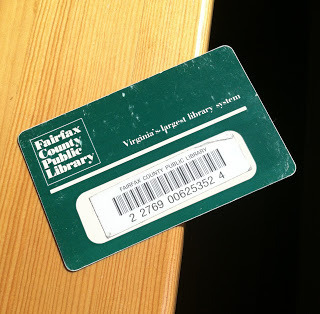
[[Note: this letter was also sent via email to libraryboard@fairfaxcounty.gov.]]
Dear Fairfax County Public Library Board of Trustees,
First: Thank you. You are volunteers, appointed because our elected officials respect your judgment and your history of action. You serve the Fairfax County Public Library system, which spans nine districts, in an age when we all feel over-scheduled. Your time is valuable, and we thank you for it.
Recently, the Board has received a great deal of criticism for actions pertaining to the Library's new organization model. In August, Mary Vavrina, vice president of The Friends of the Tysons-Pimmit Regional Library, wrote an essay decrying potential outcomes of the implementation of the "Beta Project"--including staff reductions that would eliminate children/youth services librarians, and no longer require any employee to hold a Masters of Library Science (MLS) Degree. This week, the Washington Post described the creation of the "floating collection," ending the assignment of books to specific branches, as well as the mass disposal of what may have been as many as 250,000 books. Public response was immediate and fierce, and at a crowded September 11 Board meeting, you opted to reconsider your strategic plan.
What now?
As the author of three books, with a fourth forthcoming, I'm invested in your decision. More importantly, I still carry my Fairfax County Public Library card. My family still lives in Vienna. I spent long hours reading while curled up in a beanbag chair at the Tysons-Pimmit Regional Library, from Beverly Cleary to Stephen King. In the summer, I checked out books 50 at a time. I got a sticker or a stamp for every book I read in July. Remember the guinea pig you used to keep in a big fish tank by the windows? I do. I read my first issue of The New Yorker in your periodicals section. Your shelves are where I found my very first copy of Poet's Market, and dreamed of where I might publish someday.
I once wrote for W.W. Norton about my love of public libraries, articulating the community values they entrench. For many children, a library card is their first experience with the social contract: e.g., shared possession of an item they must be trusted not to mangle or lose. Seeing a book that is particularly well-thumbed connects us with the scores of people who chose it before us; we browse not only with our eyes, but with our hands. The matrices of the Dewey Decimal system orders books in a way that is both logical (by category of topic) and arbitrary (by letter of last name), creating powerful juxtapositions; we discover new authors by fate, by chance, by feel.
You'll notice that everything I mention above emphasizes the physical presence of the book. But in your strategic plan (which I read, twice), here's what's missing: the books. The word "book" appears an average of less than once per page. In your conclusion passage, "Moving Forward," the word appears only in this context: "Libraries are changing, the library profession is changing, and the very definition of a 'book' is changing." Hmmm. Though throwing away thousands of books may not have been explicitly mandated in the strategic plan, there's no denying that it's an organic outcome of the plan's priorities.
Funny how this is how that same paragraph ends: "We all need to be on the same page in order to move forward together." Though this plan devalues books over and over in favor of "information," it can't resist using the symbolic rhetoric of the artifact. Even in this age, the book is powerful. You've got to give us a plan that recognizes that.
I've served on boards. I've read a lot of strategic plans. When I see illustrations like this one, on page 18:
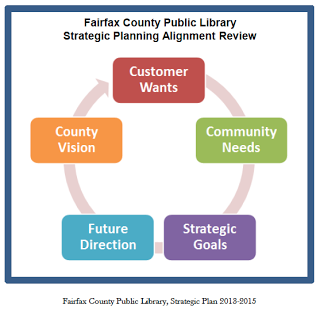
...I see a generic plan, devoid of attention to what library should do. I see the word "customer" and shiver. Though I admire how libraries have absorbed the role of a traditional neighborhood rec centers in recent decades, let's be clear: FCPL is charged with cultivating readers, not customers. Tying community functions to literacy and the dissemination of the written word should be at the core of what FCPL does. Someone's coming in for a flu shot? Your job is to make sure they read the pamphlet.
I remember gathering with other kids to watch Misty on VHS at the library in a darkened side-room, peeking through my fingers during the scary parts where I worried the horse might die. Yes, I was there to see a movie on a June day, but the librarian used the subsequent discussion afterwards to steer us toward Marguerite Henry's novel, Misty of Chincoteague, which I then read. Same with Black Beauty. That's the "extra step" that strategic plans exist to ensure, so each activity or expenditure ultimately fulfill one's mission. Yeah, the arc of planning those hours is more work-intensive than popping in Battleship. But if you cultivate smart, motivated staff--rather than driving away those with higher degrees--you'll see such programs happen.
In recent years, libraries have become a prized resource for wireless internet and eBooks. I don't object to that, particularly in the spirit of free access to information for all. But I notice that in diagrams such as this one, on page 10, under "Cornerstones and Guiding Statements":
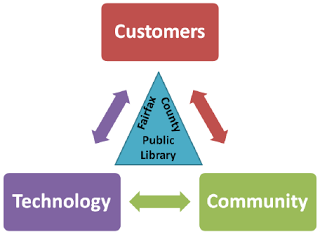
...a corrosive distinction is being made between books, viewed as the library's past, and the library's future. Books are a form of technology. If you don't believe me, ask Johannes Gutenberg; ask Tan Lin. I don't argue with the observation that books have drawbacks compared to other modes of access to creative and scholarly work. But books have unique advantages, too. Books are not a defunct precursor to "technology." Scrub that thought from this plan, please.
One of the sore points of discussion has been that the Fairfax County Public Libraries have gathered insufficient feedback from their constituents. I am sympathetic to the frustration of having little attendance at the town hall meetings that were held. But I'm wary of the proposed means of future feedback, e.g. the 900 respondents also volunteered to become FCPL Customer Advisors by "providing input to online queries three to four times each year." Not everyone is comfortable with the format of receiving and responding to online queries. That's the realm of the tech-savvy. Has anyone noted the inherent bias that will enter the data, if there isn't a counterbalancing survey of people via hard copy written forms?
When I called my mother to share my distress over the news of recent FCPL trends, she put it best. All the emphasis is on cultivating people's connection with a screen, she said. Instead of our connections with each other.
I realize that there is a certain beleaguered mindset at work. Funding cuts have been merciless. As evidenced in the strategic plan: "In FY 2011 Fairfax County faced a budget shortfall of $257 million and the library’s budget was reduced an additional 6 percent. Additional staff were lost and operating hours reduced again by 9 percent." Yet the plan goes on to declare, "With a more stable budget outlook, the focus has shifted from survival, to becoming as vital to the lives of Fairfax County residents as possible."
That's wonderful. That also means that you're committing to a higher standard to engagement between librarians and readers. I'm concerned that in asking every staffer to be fluent in all on-site duties--from opening and closing, to check-out, to web guidance, to reference database searches, to recommending titles from the children's section and adult thrillers alike--you're squeezing out the dedicated talent that makes for great service. The conversations people remember from visiting their library come from vibrant, learned recommendations by people with areas of expertise. Specialization is not a bad thing.
I'm not a nostalgist. Much as I could wax poetic about the days of chatting with the librarian as she stamped the card in the back of my latest Encyclopedia Brown or Hercule Poirot title, I accept the expediency of putting scannable codes on the spines, and of self-checkout options. Change is good, and normal. But in response to the question of "Why does FCPL exist?," the current strategic plan's answer--to “educate, enrich and empower our diverse community”--is boilerplate jargon. Perhaps “to provide books, storytime programs and Internet access” insufficiently describes what the library does, while the larger list that includes "a clean, safe space" and "an app for handheld devices" is overwhelming. But don't throw out the baby with the bathwater. Your mission is in the spirit of that litany.
I live in DC now, and so in a sense I am commenting as an outsider. But my connection to home is strong. Growing up where I did was a privilege (for all the reasons celebrated on page 8 of that strategic plan). I became a writer because of Fairfax County, and I want others to have that opportunity. Your public library system has every potential to stand out on the national landscape, and you have received a mandate from your constituency to make that happen. Start with a new strategy. In Latin, liber as an adjective means "free." As a noun, "child." Romans used the word to describe the bark of a tree--and therefore, for "book." Could there be any more perfect constellation of meanings?
Sincerely,Sandra Beasley
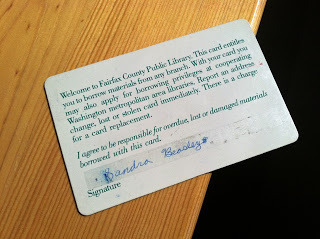
Published on September 12, 2013 11:06
September 5, 2013
The Other Self
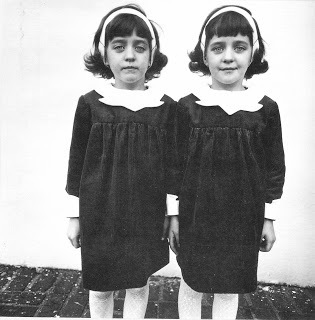
We glimpse our Other Selves, from time to time. The actor/actress/porn star who has your eyes and cheekbones, causing the cashier to double-take. Seeing a younger brother playing with his son, while you have chosen not to have kids. Passing a trimmer version of yourself on the sidewalk; eyeing her work-out clothes, the racquet she's carrying, and thinking I never should have given up tennis or Gotta get a haircut.
I've been thinking of the ways we determine our lives. (Photograph of "Identical Twins, Roselle, New Jersey, 1967" by Diane Arbus.) There are subjective choices--things we could have done differently, but much the same end. For me that includes choosing a graduate program in Virginia or DC, either of which fundamentally returned me to this literary community. Or working things out with men who, let's face it, sooner or later would have imploded no matter what I did. But then there's the life-changers, like passing up on a magazine job that would have moved me to the Berkshires when I was 24. Or, five years later, saying Yes to living in Mississippi for a month.
There is a time when I considered enrolling in PhD programs. But I didn't apply for a couple of reasons. First, I always worried I was a bit uptight--a brittle perfectionist--and six years of scholarly study seemed like it would only compound that personality trait. Second, I was utterly embarrassed at my lack of a second language. (I'd studied Latin in high school, but dropped it before the AP level.)
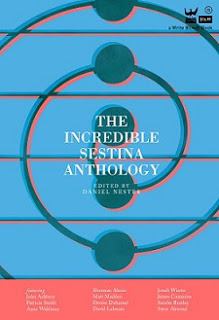 My MFA gave me everything I needed to embark on a creative writing career. But sometimes I wish I'd done a doctoral program for two specific purposes: I'd love to write a collection of craft essays, and I'd love to edit an anthology. I'm enough out of the PhD loop that I don't actually know if either track is honored, as opposed to writing critical essays--but if not, they should be. Making time for either feels so unlikely in this stage of my life, in which I often have to take a crass dollars-per-word approach to writing--that's the trade-off of being a "full-time writer." Poetry is my indulgence, my pleasure; feels like I can't afford a prose one. Travel is hard on the scholarly brain.
My MFA gave me everything I needed to embark on a creative writing career. But sometimes I wish I'd done a doctoral program for two specific purposes: I'd love to write a collection of craft essays, and I'd love to edit an anthology. I'm enough out of the PhD loop that I don't actually know if either track is honored, as opposed to writing critical essays--but if not, they should be. Making time for either feels so unlikely in this stage of my life, in which I often have to take a crass dollars-per-word approach to writing--that's the trade-off of being a "full-time writer." Poetry is my indulgence, my pleasure; feels like I can't afford a prose one. Travel is hard on the scholarly brain. But Daniel Nester has done what I have not. (Translation: He is amazing.) His Incredible Sestina Anthology is going to be a beyond-smashing collection--the table of contents includes everyone from Sherman Alexie to Elizabeth Bishop to John Ashbery to Anne Waldman. I'm honored to be included; I hope there are whole courses built around it. That's another craft essay that I keep making notes toward in my head..."Confessions of a Sestina Addict." The book is going to be out from Write Bloody in October, and you can pre-order it here.
A question, particularly if you're still a student: what is the most outlandish dream you have, in terms of your craft? What is the location/program/career that makes that feel most possible? The Other Self always seems to have a bigger life, and of course that's not true; don't be seduced by that. But don't minimize your options, either.
Published on September 05, 2013 12:24
August 26, 2013
Poems About the Body
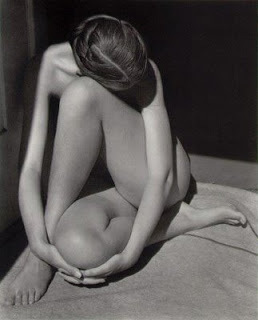
Landscape.
Politic.
Costume.
Confession.
Debt.
Declaration.
What you wake into.
What you dance out of.
A body.
The body.
A few weeks back, Facebook friends offered suggestions for poems about the body. Here is a variation of that list, in no particular order and with links to texts (always best to check online texts against the original source). Suggestions came from poetry lovers, teachers, editors, and authors, including Ada Limón, Kirsten Sundberg Lunstrum, and Robert Pinsky. Enjoy~
("Nude, 1936," Edward Weston)
"A Story about the Body" by Robert Hass
"homage to my hips" by Lucille Clifton
"My Beloved" & "Breasts" by Charles Simic
"The Consolations of Sociobiology" by Bill Knott
In Posse Review's "Poetry and the Body" issue by various
"Embalming" by Scott Cairns
"[i like my body]" by e.e. cummings
"The Plan is the Body" by Robert Creeley
...no text, but audio of Creeley reading here
"Catalyst" by A.R. Ammons
"Spring and All" by William Carlos Williams
"Passages 18: The Torso" by Robert Duncan
"Ode to My Hands" by Tim Seibles
"The Race" by Sharon Olds
"History of My Body" by Marie-Elizabeth Mali
...no text, but video of Mali reading here
"the floating poem, unnumbered" by Adrienne Rich
"Sonnet XXVII" by Pablo Neruda
"Hands" by Sarah Kay
...no text, but video of Kay reading here
"First Poem for You" by Kim Addonizio
“Thirty Lines about the Fro” by Allison Joseph
“A Hand” by Jane Hirshfield
“Sean Penn Anti-Ode” by Dean Young
“The Routine Things Around the House” by Stephen Dunn
“Consider the Hand That Writes This Letter” by Aracelis Girmay
"New Heaven and Earth" by D. H. Lawrence
"Mummy of a Lady Named Jemutesonekh" by Thomas James
"The Bladder" by David Keplinger
"My Husband's Back" by Susan Minot
"Not the Furniture Game" by Simon Armitage
"The Connoisseuse of Slugs" by Sharon Olds
"Samurai Song" by Robert Pinsky
"Strongly Scented Sonnet" by Rhoda Janzen
"The Cleaving" by Li-Young Lee
"Question" by May Swenson
"The Lovers" by Dorianne Laux
"Free Union (L'Union libre)" by André Breton
"I Knew a Woman" by Theodore Roethke
"The Language of the Brag" by Sharon Olds
"I Sing the Body Electric, Especially When My Power's Out" by Andrea Gibson
...or video of Gibson reading here
"The Body is Not an Apology" by Sonya Renee
...no text, but video of Renee reading here
"How to Make Love to a Trans Person" by Gabe Moses
"In Celebration of My Uterus" by Anne Sexton
"Hip-Hop Ghazal" by Patricia Smith
"Anodyne" by Yusef Komunyakaa
...or video of Komunyakaa reading here
"Anything from..."
e.e. cummings
Beth Bachmann's Temper
Frank Bidart
Walt Whitman
Sharon Olds
David Keplinger's The Most Natural Thing
Stacey Waite's Butch Geography
Morgan Lucas Schuldt
Sally Rosen Kindred suggested Lisa Russ Spaar's "Hallowe'en," going so far as to type it out. (The poem appears nowhere online and Glass Town, Spaar's first collection, is out of print.) I've loved that poem for years, so thanks to Sally for the excuse to share it here:
HALLOWE'EN
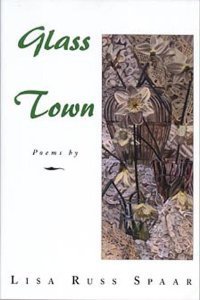 On the night of skulled gourds,
On the night of skulled gourds,of small, masked demons
begging at the door,
a man cradles his eldest daughter
in the family room. She's fourteen,
she's dying because she will not eat
anymore. The doorbell keeps ringing;
his wife gives the sweets away.
He rubs the scalp
through his girl's thin hair.
She sleeps. He does not know
what to do.
When the carved pumpkin
gutters in the windowglass,
his little son races through the room,
his black suit printed with bones
that glow in the dark.
His pillowsack bulges with candy,
and he yelps with joy.
The father wishes he were young.
He's afraid of the dream
she's burning back to,
his dream of her before her birth,
so pure, so perfect,
with no body to impede her light.
~Lisa Russ Spaar
Published on August 26, 2013 06:50
August 19, 2013
John Hollander: An Appreciation
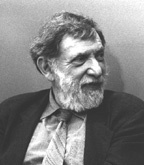 Only as I paste in his photo, do I realize: I never actually met John Hollander. That's a punch in the gut, a regret. Because he is in my DNA as a writer. When I was an undergraduate at the University of Virginia, I took a course on poetic forms with Stephen Cushman, who had himself taken a course on forms with John Hollander while a graduate student at Yale. We studied Hollander's nimble articulations of iambs and sonnets; for the first time I really got the difference between a dactyl and an anapest, and scansion became a language I could speak. I loved the idea that the formal qualities of a poem, if handled with knowing intent, could offer clues to interpretation and an organic rhetoric--with the qualities of conflict, compromise, closure--apart from explicit text. My left-brain self, which had once thrived on the studies of mathematics and science, was engaged for the first time. I abandoned my fixation on a "practical" life course, e.g. law school, to the goal of becoming a writer.
Only as I paste in his photo, do I realize: I never actually met John Hollander. That's a punch in the gut, a regret. Because he is in my DNA as a writer. When I was an undergraduate at the University of Virginia, I took a course on poetic forms with Stephen Cushman, who had himself taken a course on forms with John Hollander while a graduate student at Yale. We studied Hollander's nimble articulations of iambs and sonnets; for the first time I really got the difference between a dactyl and an anapest, and scansion became a language I could speak. I loved the idea that the formal qualities of a poem, if handled with knowing intent, could offer clues to interpretation and an organic rhetoric--with the qualities of conflict, compromise, closure--apart from explicit text. My left-brain self, which had once thrived on the studies of mathematics and science, was engaged for the first time. I abandoned my fixation on a "practical" life course, e.g. law school, to the goal of becoming a writer. So I looked for MFA programs that heeded form and world traditions, which brought me to American University, and Washington, DC. I took a full-time job at the Phi Beta Kappa Society's national headquarters to cover tuition and living expenses, and discovered that Hollander was one of the judges for a book prize I administered. When I came on board, all of the first-round reads were already sent out--except, I realized, a book that had been misfiled under the award for poetry (creative) versus poetry (criticism). I leafed through the book, thought "This looks substantial," and pleaded with my supervisor that it should be considered. She said, OK--if I could convince a judge to take on an extra book. That judge turned out to be John Hollander ("talk poet to poet," I steeled myself before asking him) and the book, Susan Stewart's Poetry and the Fate of the Senses, went on to win the 2003 Christian Gauss Award for Literary Criticism. One of my earliest lessons that even when you're an underling, paying attention and speaking up can change the course of events.
Of course, as any administrator will attest, some of our exchanges were less fruitful. I once had to plead with him to turn in some overdue reader reports. He responded by saying the books in question had been delivered to his mailbox at the end of his driveway, but his driveway was long and very icy, and did I want him breaking a bone in the name of Phi Beta Kappa? His voice was kind in phone calls, but reserved.
All the while I was driving to AU three times a week for class, where my principle mentor was Henry Taylor--who I had first sought out as an overzealous UVA first year, looking to interview a poet for my underground lit mag. At the time he was on a clerihew kick. We'd talked for hours, then stayed in touch; he recommended me for a fellowship, and then on the first day of classes he told me he was retiring. Ooof. He stayed around until my thesis was complete, and we segued to "independent study," which meant sitting in his office talking (a little bit of) poetry and telling (a whole lot of) stories. Which is how I heard about the time he arrived at a literary conference and, because he could, adopted the name tag of...John Hollander. And attended the party accordingly, making conversation, answering questions. This would have been back in Henry's drinking days, and I don't think Dr. Hollander appreciated the homage. But I was delighted by the tale--a humanizing lesson that even great scholars could be pranksters, and could be pranked. In those AU office days Henry also workshopped my Chronic Medea sonnet sequence, and played matchmaker between me and the sestina. In all the important ways, Dr. Hollander, he carried on your values.
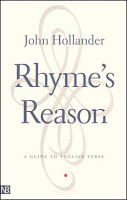 Now, when I teach--before I consider any other craft book for the syllabus--I use John Hollander's Rhyme's Reason. No other book is so deft and concise in demonstrating principles of sound, line, and meter. It's benzedrine for form-lovers. Consider this effortless example:
Now, when I teach--before I consider any other craft book for the syllabus--I use John Hollander's Rhyme's Reason. No other book is so deft and concise in demonstrating principles of sound, line, and meter. It's benzedrine for form-lovers. Consider this effortless example:"A line can be end-stopped, just like this one,
Or it can show enjambment, just like this
One, where the sense straddles two lines: you feel
As if from shore you'd stepped into a boat;"
Or this:
"Milton and Wordsworth made the sonnet sound
Again in a new way; not with the sighs
Of witty passion, where fierce reason lies
Entombed in end-stopped lines, or tightly bound
In chains of quatrain: more like something found
Than built--a smooth stone on a sandy rise,
A drop of dew secreted from the sky's
Altitude, unpartitioned, whole and round.
The octave's over; now, gently defying
Its opening tone, the sestet then recalls
Old rhythms and old thoughts, enjambed, half-heard
As verses in themselves. The final word,
Five lines way from what it rhymes with, falls
Off into silence, like an echo dying."
I'll be honest: Rhyme's Reason is rarely the students' favorite part of the semester. For most of them, his didactic exercises go down like cough syrup, his jokes seem contrived, his tastes old-fashioned. They're only too happy to scoot along to free verse and talking about what the poem means to them. But there's always one or two who perk up--who appreciate, like I did in college, that intensity of wit and those acrobatics of language, and who embrace that poetry can have both objective and subjective qualities. For those one or two students, he's a revelation. The lineage continues.
Rest in peace, John Hollander. You were a brilliant scholar. You shaped my ear, and my sensibility (and many more than me, more than a simplistic head-count of "formalists" would describe). Yet you were also a real person in the real world, and that helped me envision a future where I, too, could be a real poet. I am so grateful.
Published on August 19, 2013 11:24
August 12, 2013
The Hangman
Over the weekend I was looking up pastor Martin Niemöller's poem ("First they came for the communists...."), which I had push-pinned to the wall of my teenage bedroom. Along the way I found this, which I'd never seen before: a 1964 short video adaptation of Maurice Ogden's poem, "The Hangman." The production team is Paul Julian, who did the animation, and director Les Goldman. The narrator is character actor Herschel Bernardi, who was the singing voice of Zero Mostel in the Broadway launch of Fiddler on the Roof (he also voiced the Jolly Green Giant, and Charley the Starkist Tuna, though that seems almost unfair to mention). The music is composed by Serge Hovey, who was also part of the effort to record the complete songs of Robert Burns.
This is really quite beautiful--and chilling. Now that I've seen it, I can't get it out of my head. Thanks to the Academic Film Archive of North America for archiving it online.
Published on August 12, 2013 06:51
August 6, 2013
Poetry Calling
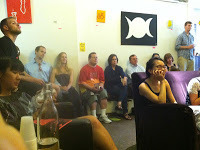 Last night we had a big crowd for the Omission Summer Poetry Tour's stop at Baked & Wired (which serves all your standard coffeehouse fare...plus sweet tea so rich it should carry a warning label...plus bacon cupcakes). The work was great; as I told the audience, this felt like a snapshot of What's Being Written Now, and I was honored to be part of that constellation. Our host Diana Khoi Nguyen was every bit the charmer I expected. Justin Boening read before me, and is pictured below. His PSA chapbook (selected by Dara Wier) is gorgeous, and I'm looking forward to it. My vision of "area poets" got a little bigger, as I learned Miriam Bird Greenberg had spent the summer tending to a grandmother who lives mere miles from my family's house in Vienna, and John Fenlon Hogan is here to stay awhile.
Last night we had a big crowd for the Omission Summer Poetry Tour's stop at Baked & Wired (which serves all your standard coffeehouse fare...plus sweet tea so rich it should carry a warning label...plus bacon cupcakes). The work was great; as I told the audience, this felt like a snapshot of What's Being Written Now, and I was honored to be part of that constellation. Our host Diana Khoi Nguyen was every bit the charmer I expected. Justin Boening read before me, and is pictured below. His PSA chapbook (selected by Dara Wier) is gorgeous, and I'm looking forward to it. My vision of "area poets" got a little bigger, as I learned Miriam Bird Greenberg had spent the summer tending to a grandmother who lives mere miles from my family's house in Vienna, and John Fenlon Hogan is here to stay awhile. 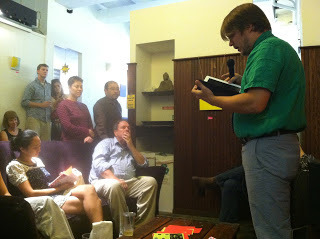
Afterwards we wandered down to Mr. Smith's, one of those venerable Georgetown institutions with the crumbly brick and the peacock-hued stained glass, where we snagged two tables in an outdoor courtyard. I wouldn't want to be there on a Friday night when the Jager-bombs are 4 for $10, but on a Monday night it was kind of awesome thanks to inexpensive house IPAs, a basket of curly fries for the table, and a surprisingly tasty vegan Israeli couscous dish with spinach and "sundry" tomatoes (how that snuck on the menu is a mystery). All of which took a backseat to the conversation, the kind of totally indulgent poetry-talk--on blurbs and contests and conferences and feuds--that I crave but rarely find outside AWP. I had fun eavesdropping on the post-Columbia MFA conversations, a program whose dynamics seem so very different from my time at American University.
Not surprisingly, I woke up this morning wanting to write. There's about five calls for poems that are uppermost on my radar, on topics ranging from perfume to gravy to politics. Like many poets I'm both lured in by the Los Angeles Times' call for "op-ed" poems and turned off by the condescension of the tone ("if you have an opinion that can only be expressed in rhymed iambic pentameter or lively doggerel, in a haiku or limerick, now's your chance to express it").
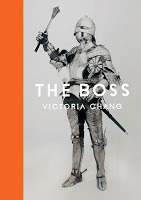 I've also been inspired to dive back into blogs. Leslie Pietrzyk has an epic recount of her travels through small-town Georgia, which I must re-read before I embark on the Georgia Poetry Circuit in spring 2014, which takes me to nine colleges around the state for readings. Gotta brush up on my Flannery O'Connor before then, too. I found out from Victoria Chang's blog that she has a third book out, The Boss, courtesy of the new McSweeney's poetry imprint. You can subscribe to said imprint, $40 for four "issues" (a.k.a. books). I'm assuming these are poems in series with the ones she wrote for VQR a few issues back--fragmented views of a dystopian workplace--which has me intrigued. And I'm not going to link to any one post on "The French Exit," because they're all so damn good; Elisa Gabbert keeps one of the most interesting and substantive blogs among poets these days, even when (like most of us now) she only updates once a week.
I've also been inspired to dive back into blogs. Leslie Pietrzyk has an epic recount of her travels through small-town Georgia, which I must re-read before I embark on the Georgia Poetry Circuit in spring 2014, which takes me to nine colleges around the state for readings. Gotta brush up on my Flannery O'Connor before then, too. I found out from Victoria Chang's blog that she has a third book out, The Boss, courtesy of the new McSweeney's poetry imprint. You can subscribe to said imprint, $40 for four "issues" (a.k.a. books). I'm assuming these are poems in series with the ones she wrote for VQR a few issues back--fragmented views of a dystopian workplace--which has me intrigued. And I'm not going to link to any one post on "The French Exit," because they're all so damn good; Elisa Gabbert keeps one of the most interesting and substantive blogs among poets these days, even when (like most of us now) she only updates once a week. There's a lot to do. I must be a little more settled, because creative ideas are simmering to the surface again. but there's a LOT to do. Luckily this life is long...and also I have enough kale and watermelon in the fridge to skip grocery shopping for a bit.
Published on August 06, 2013 08:51



